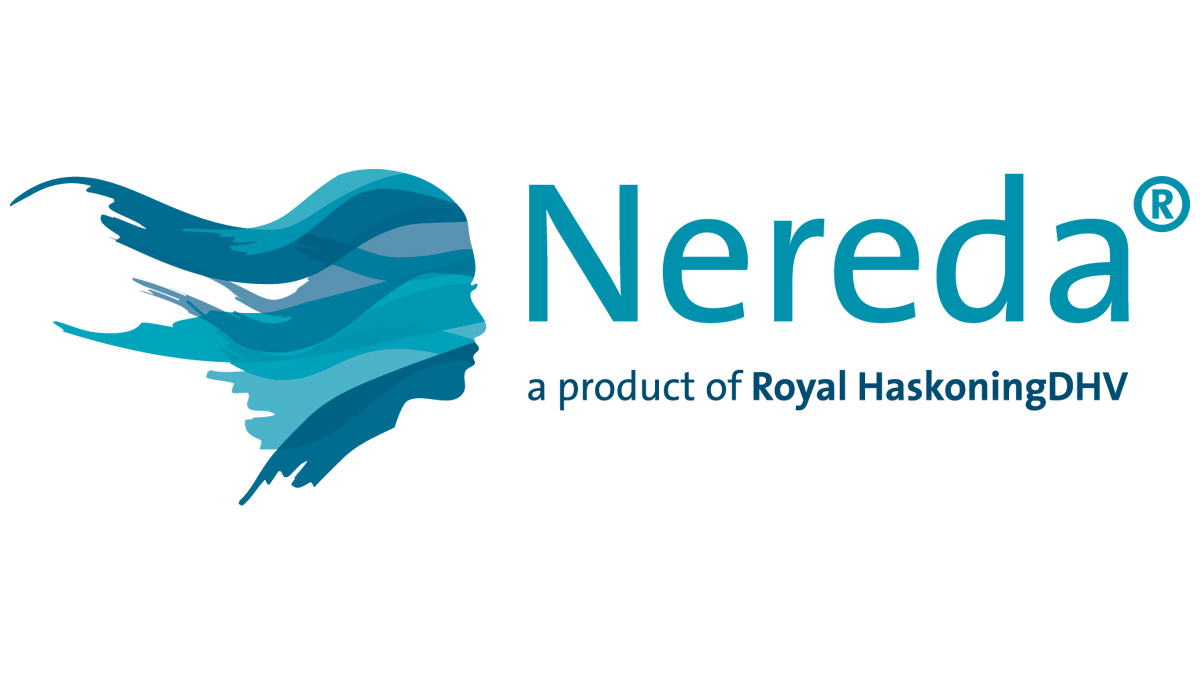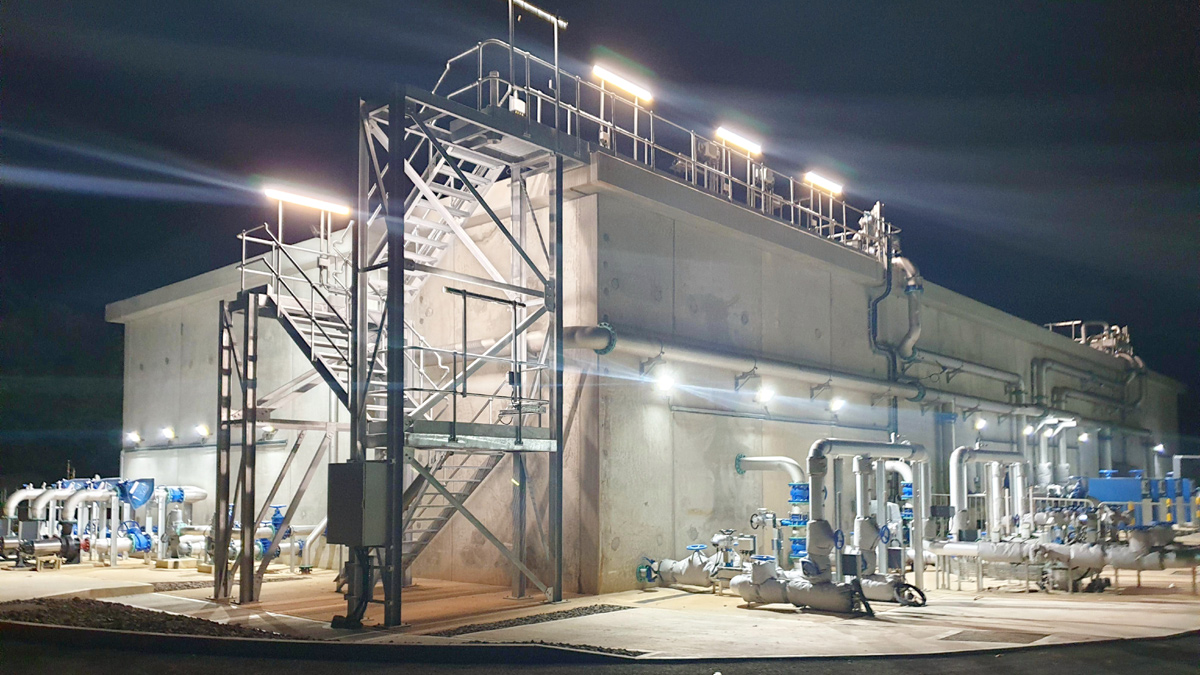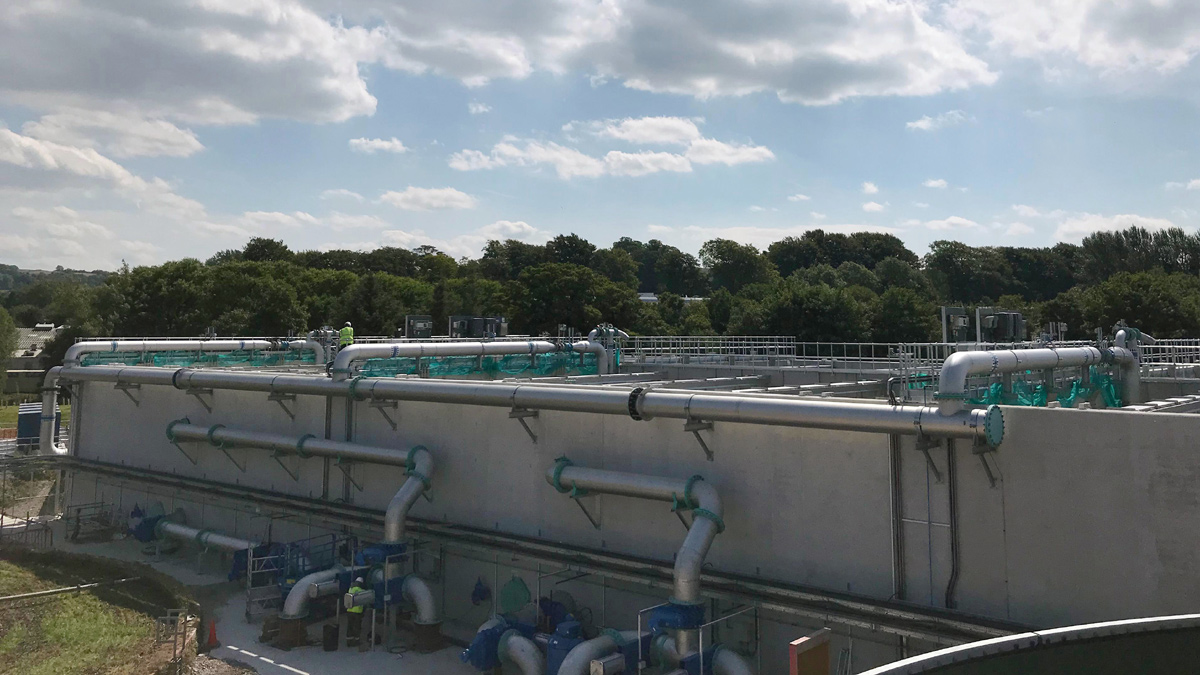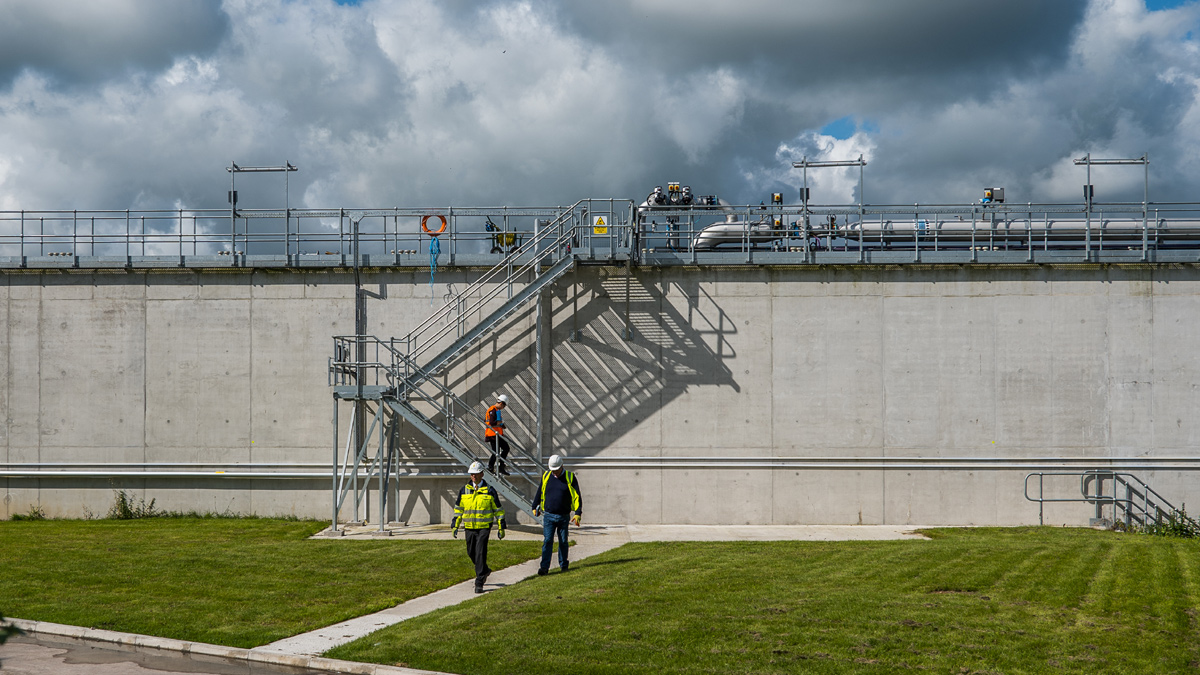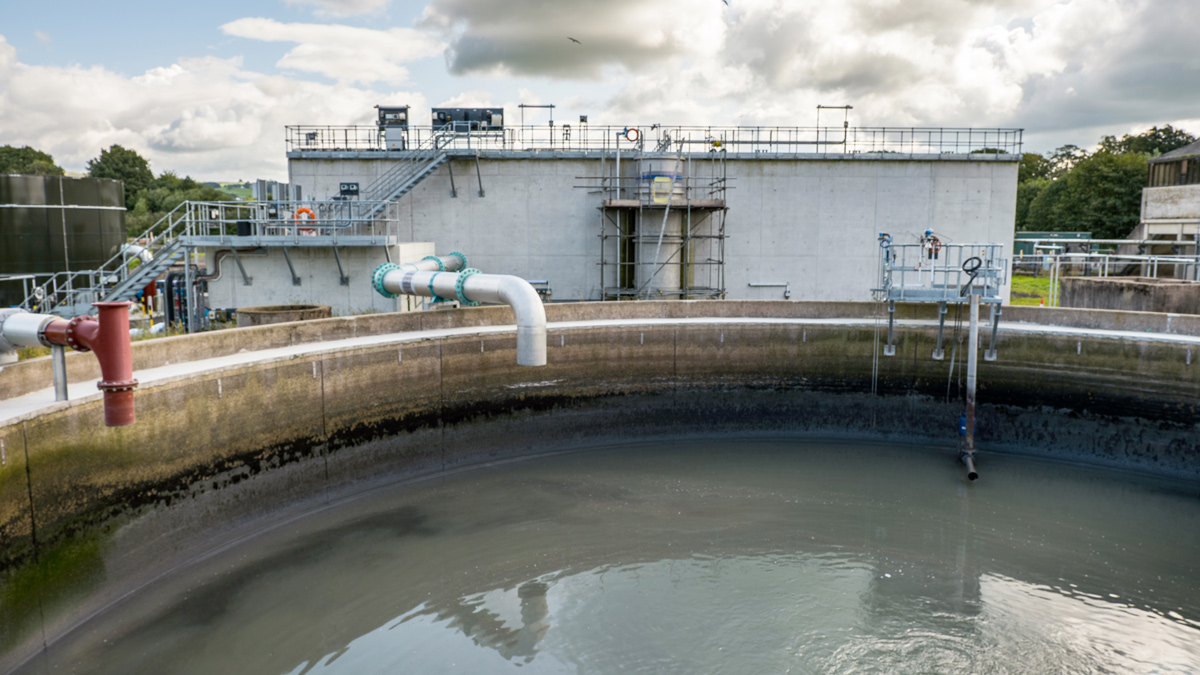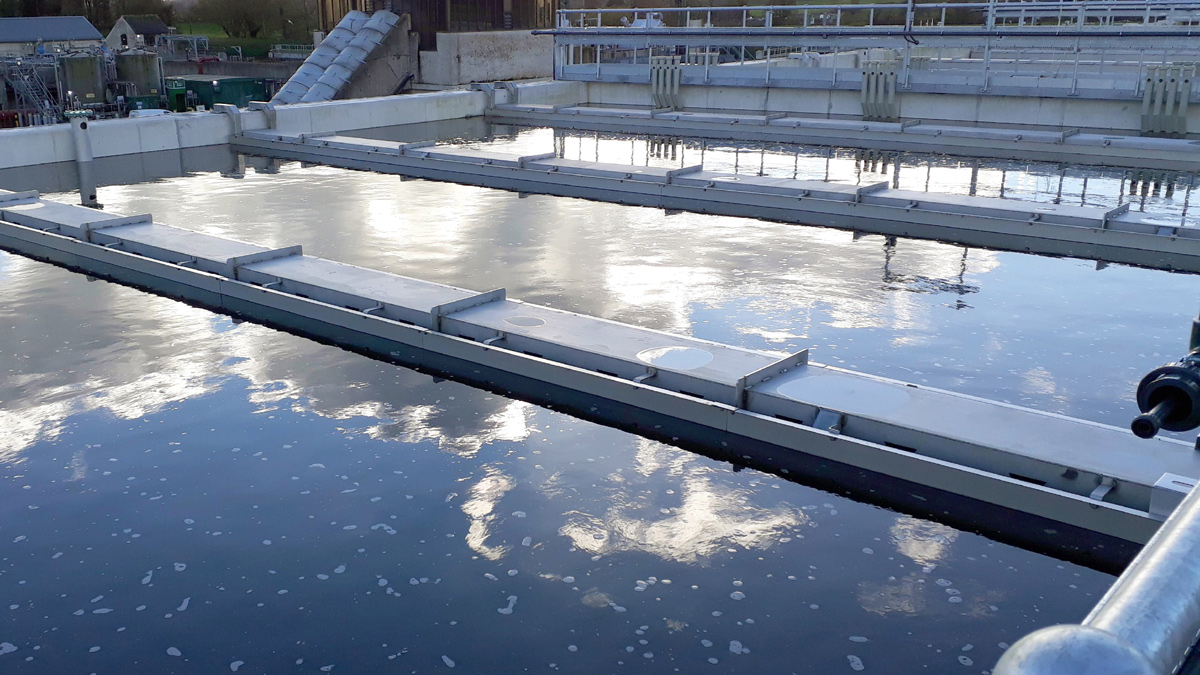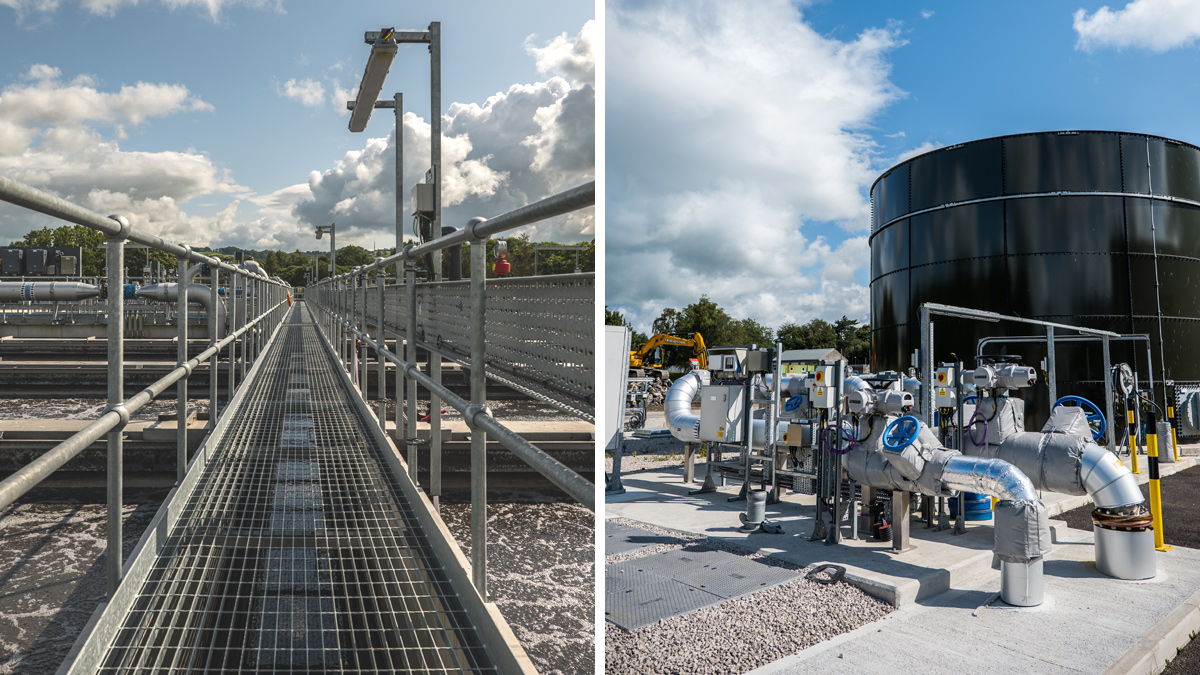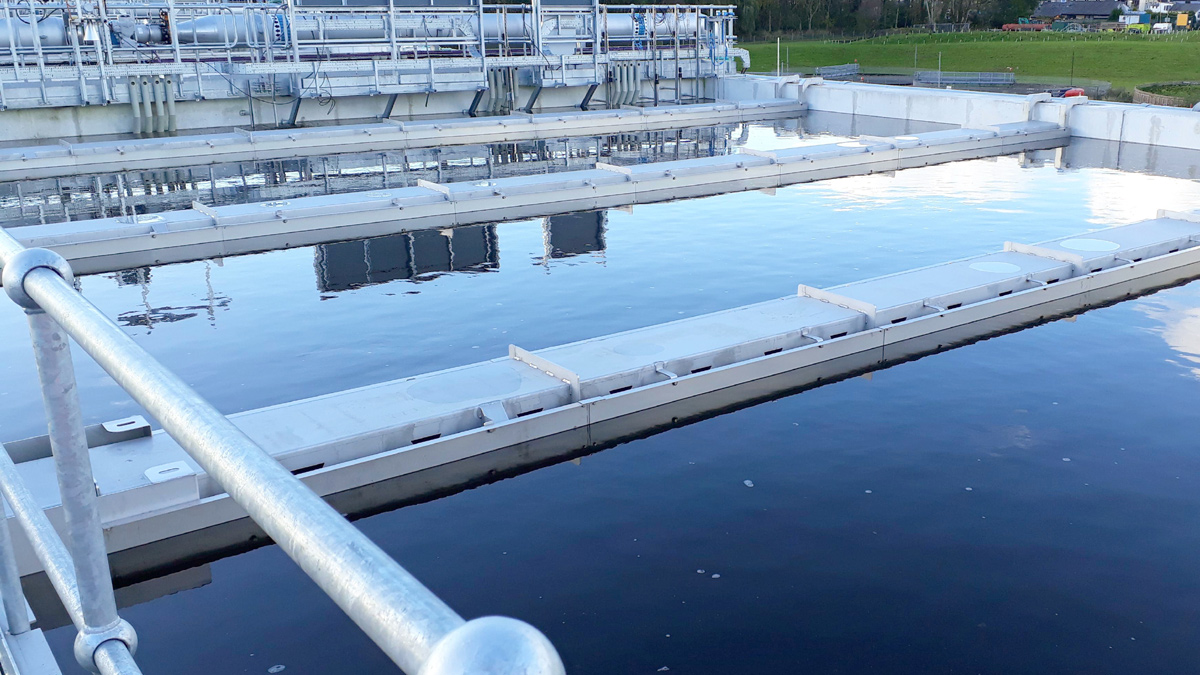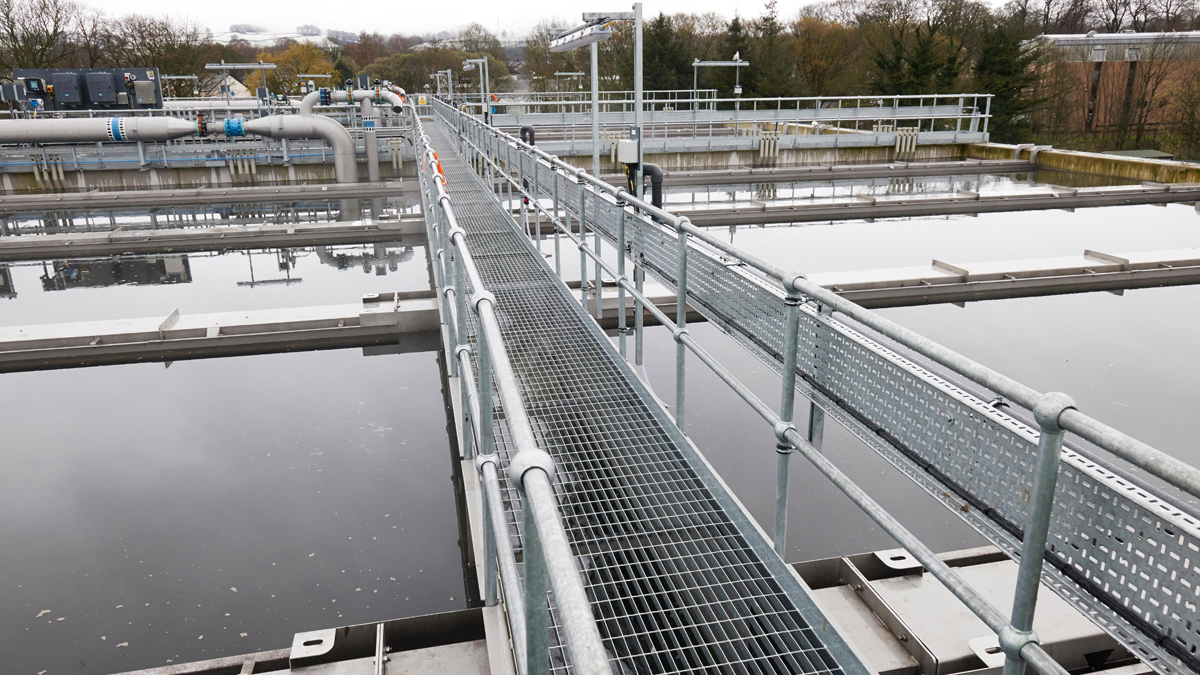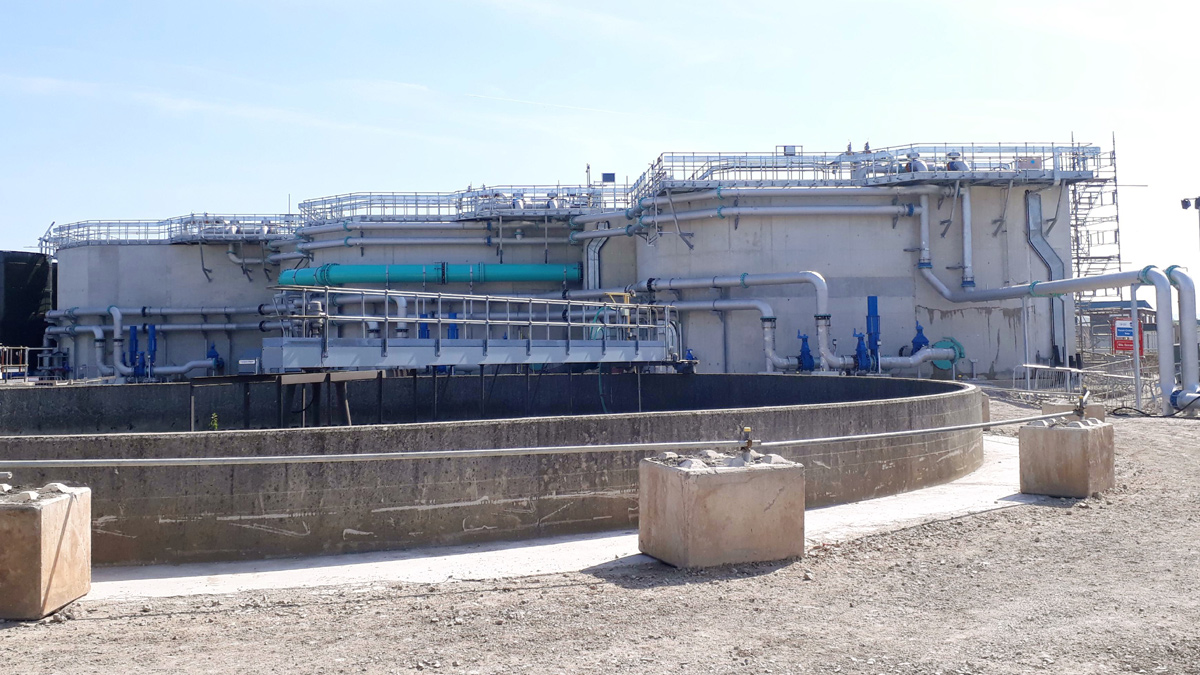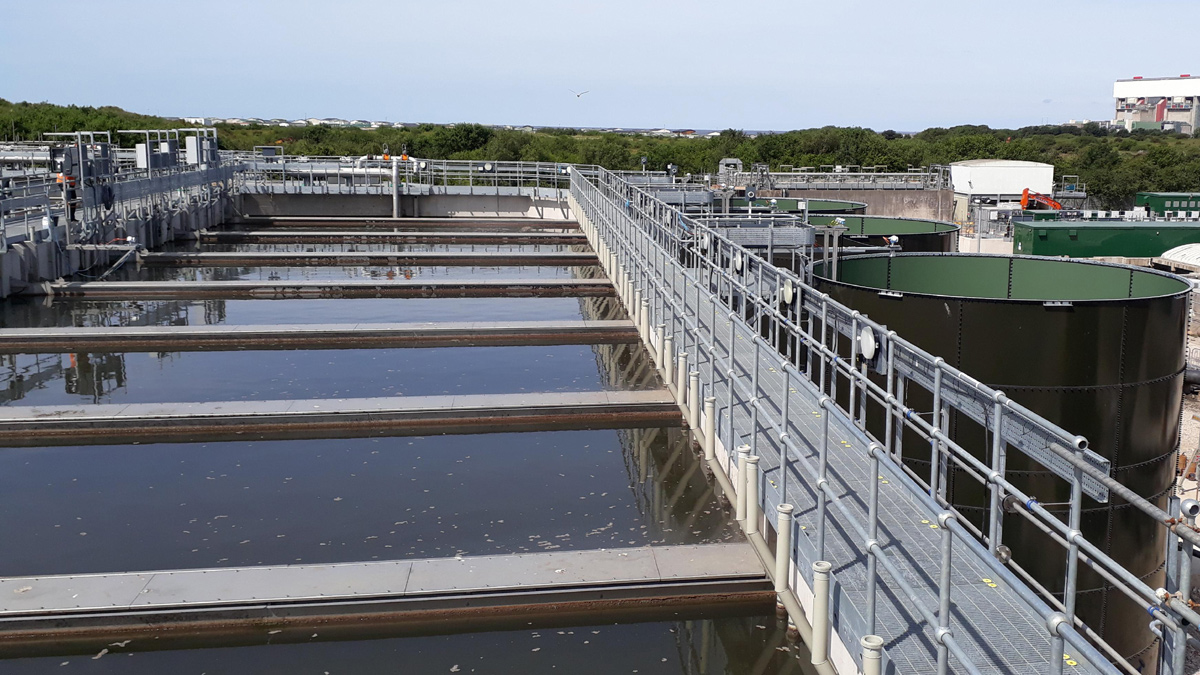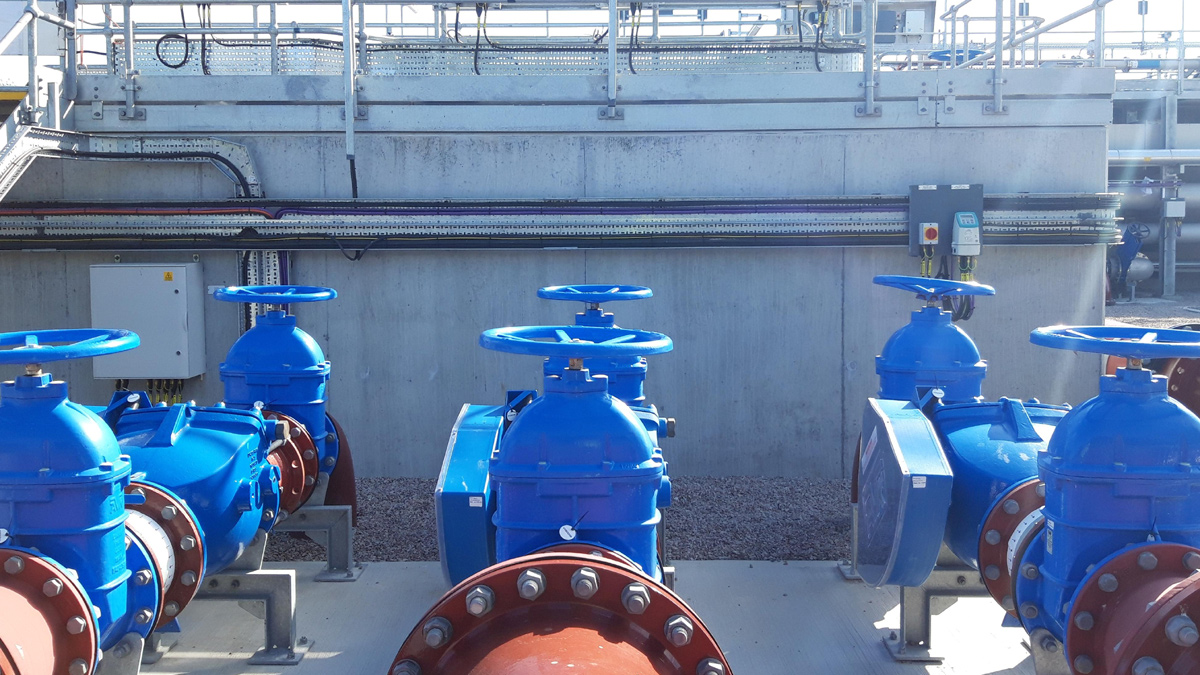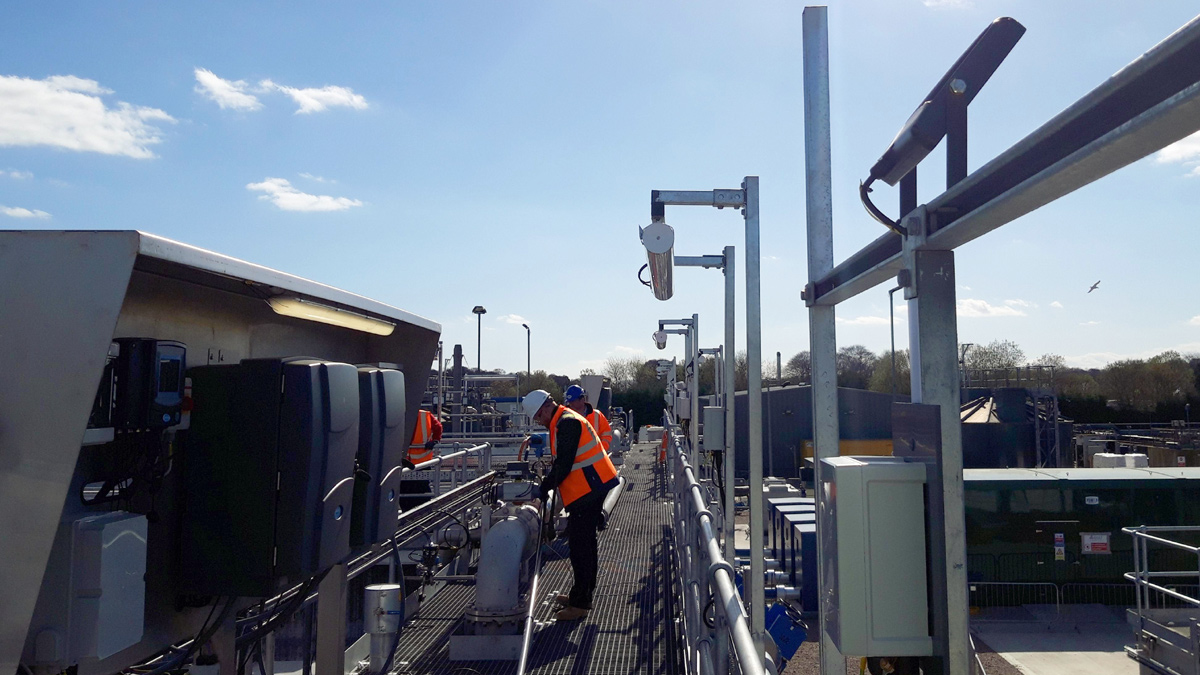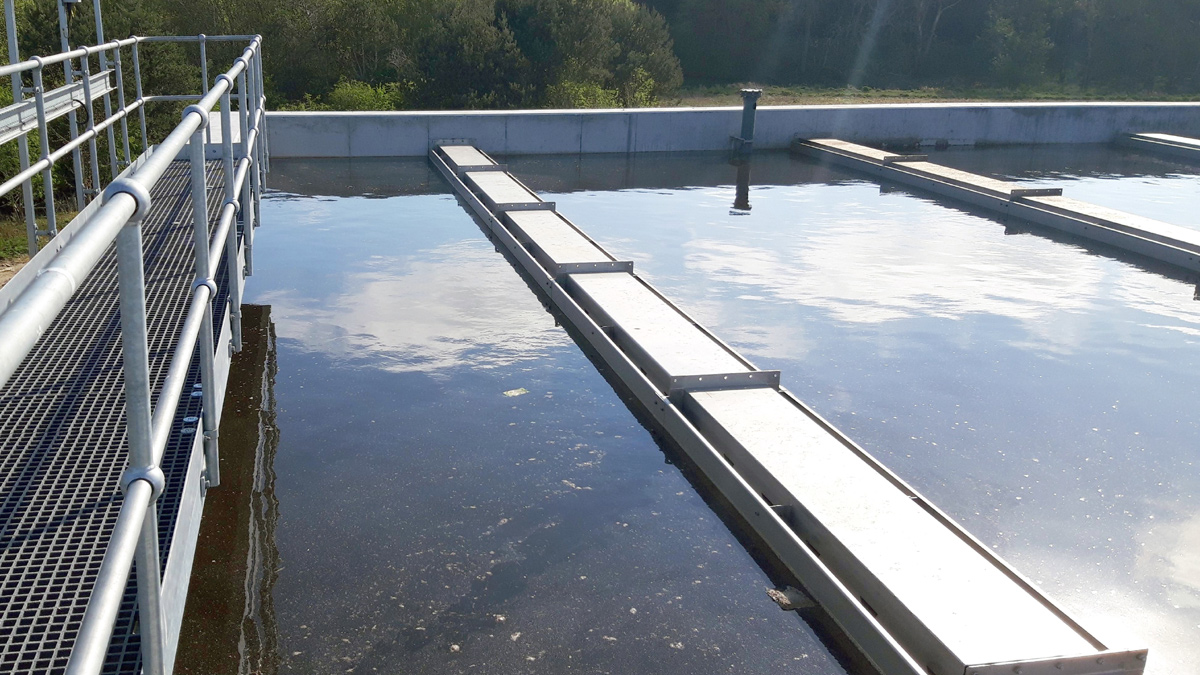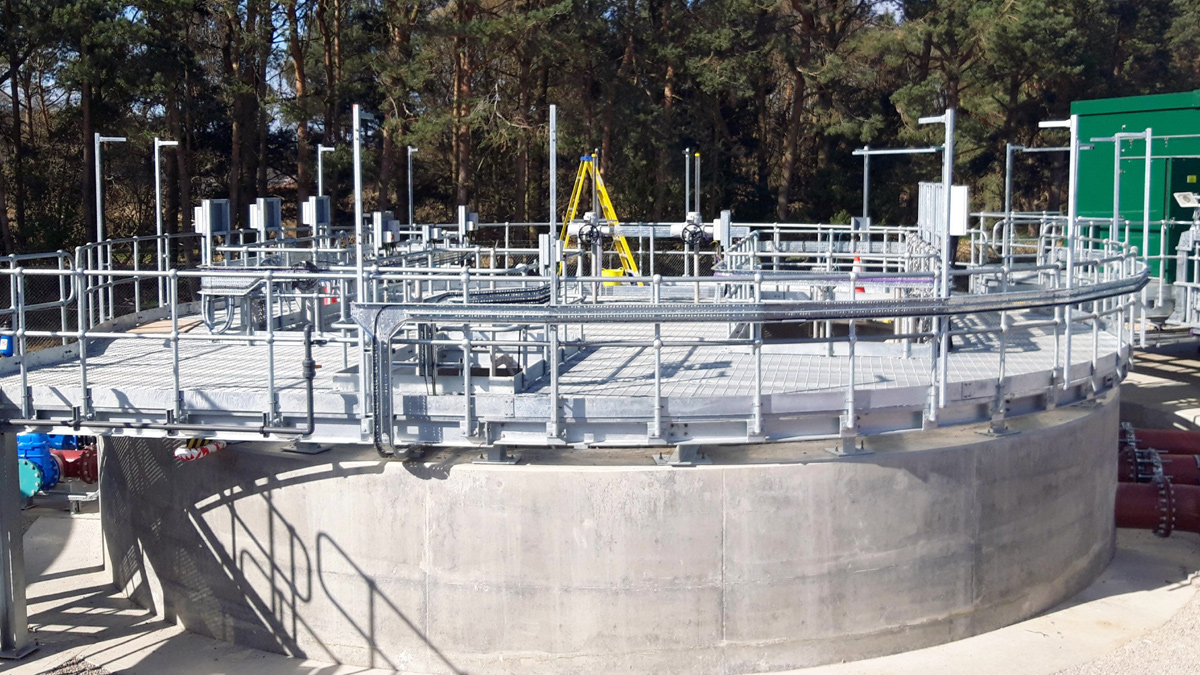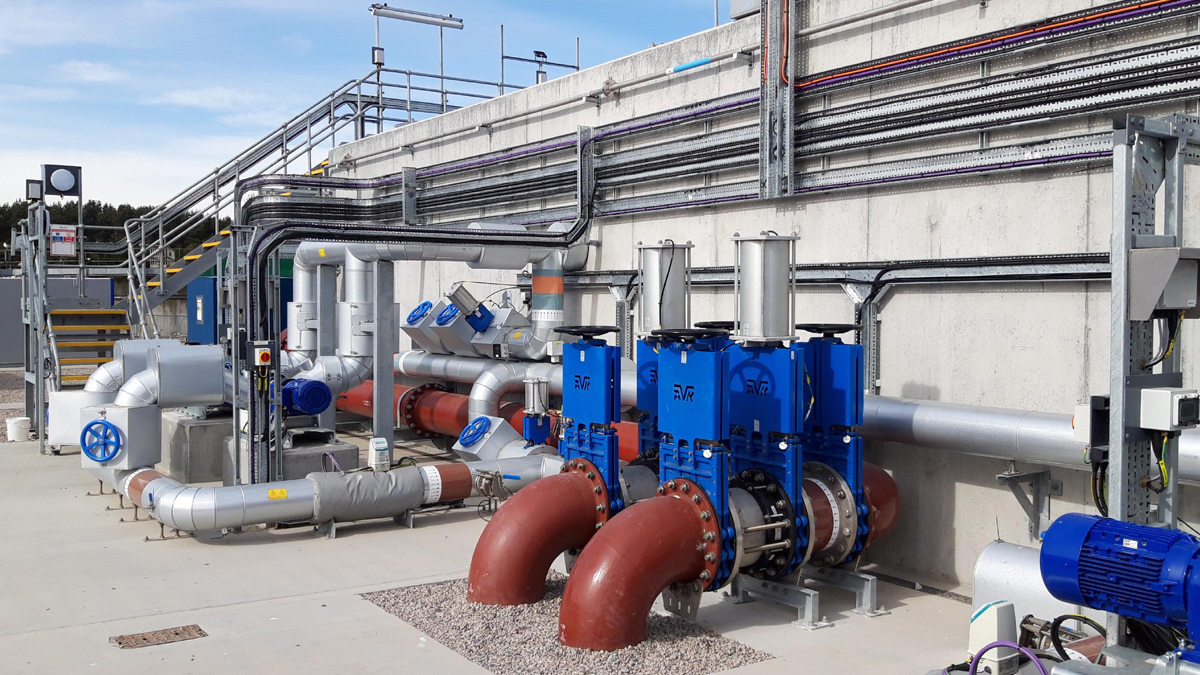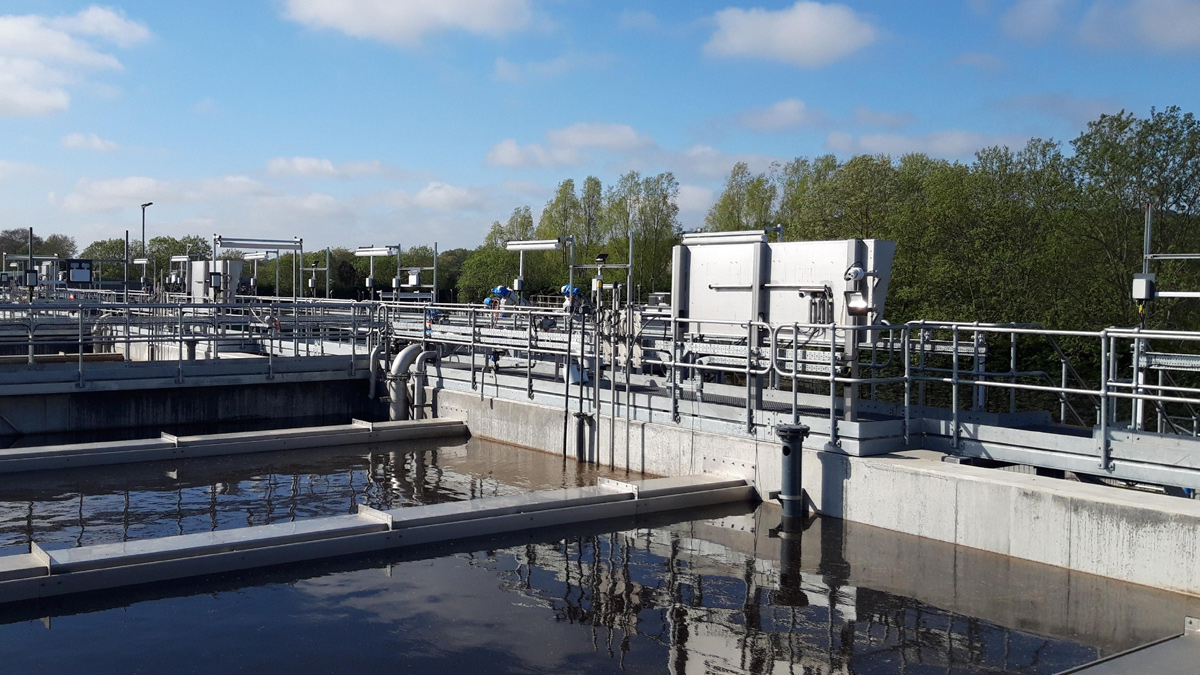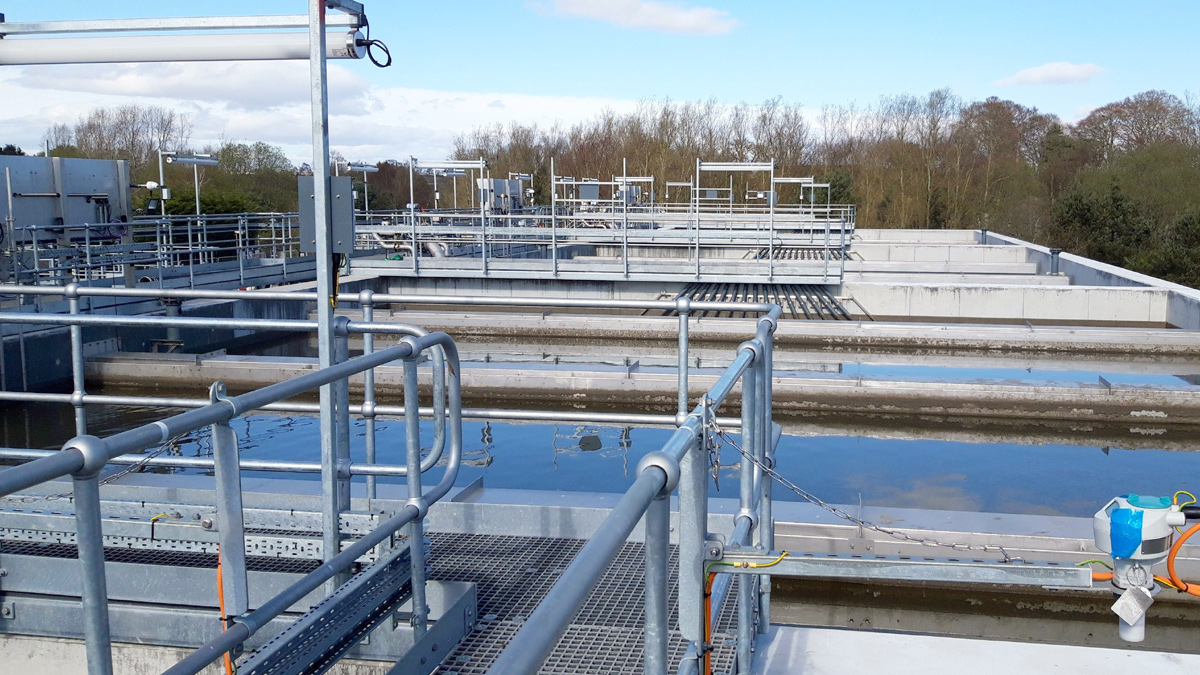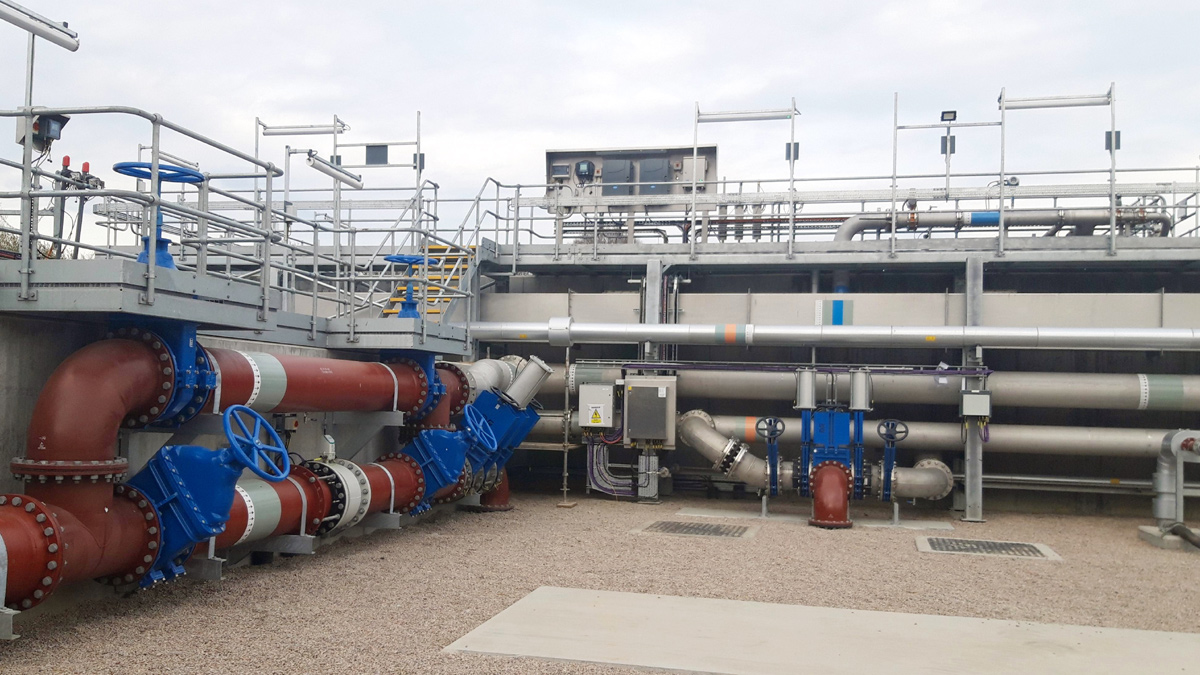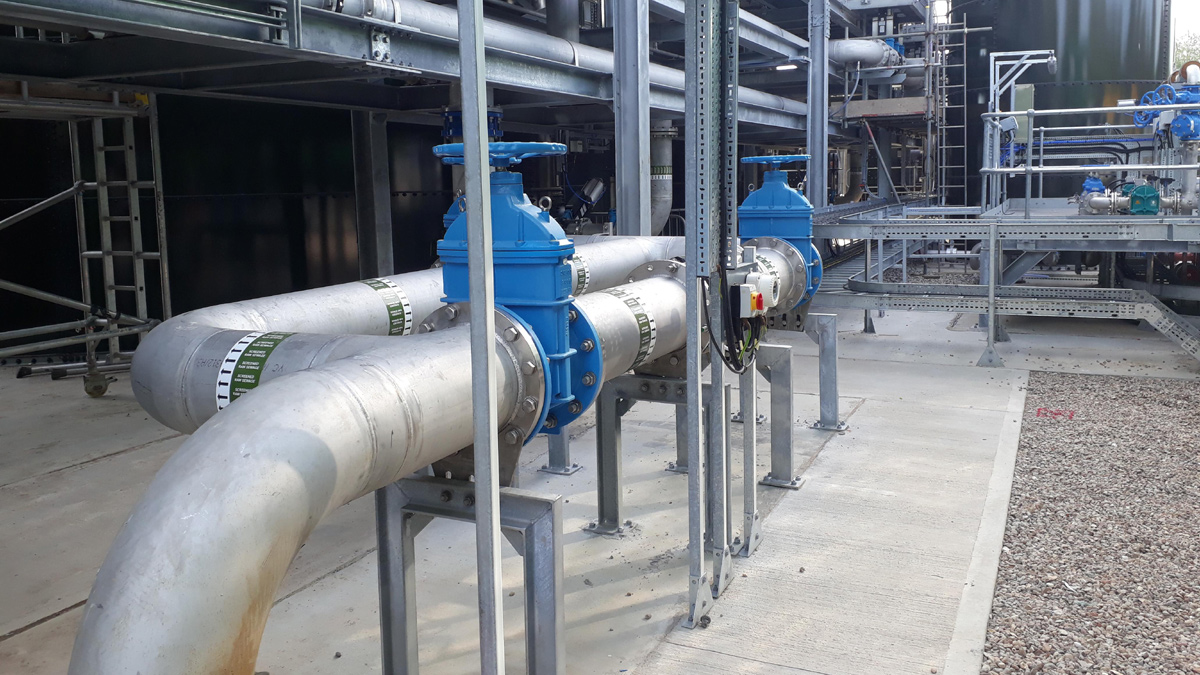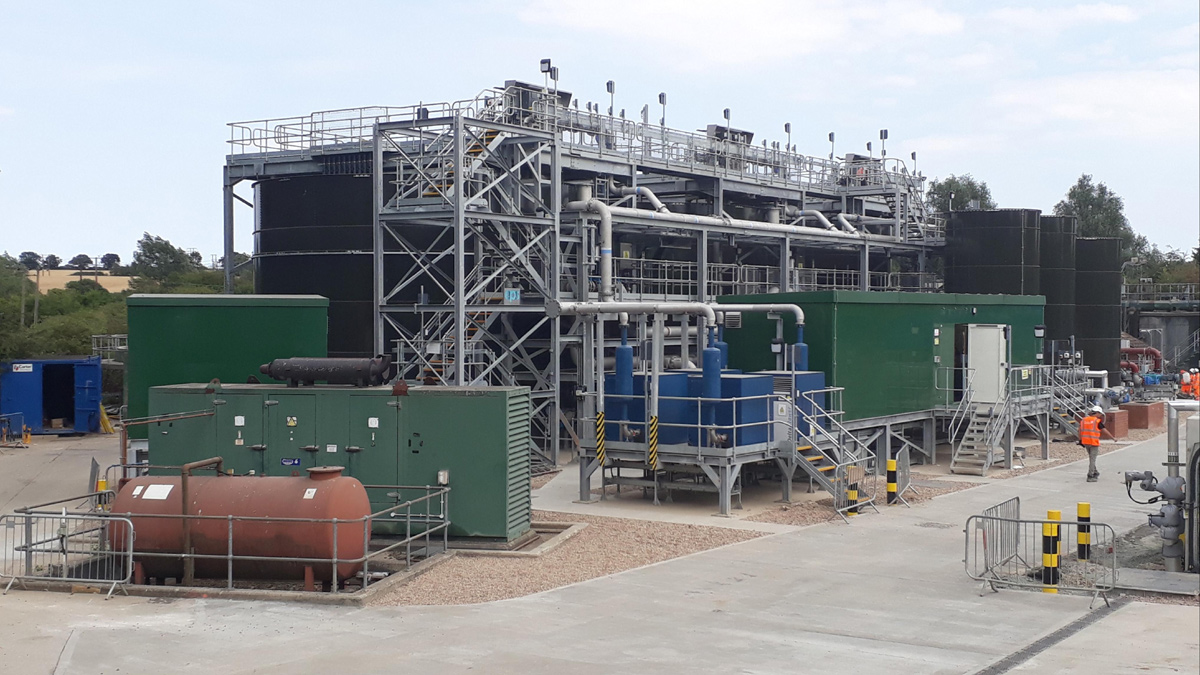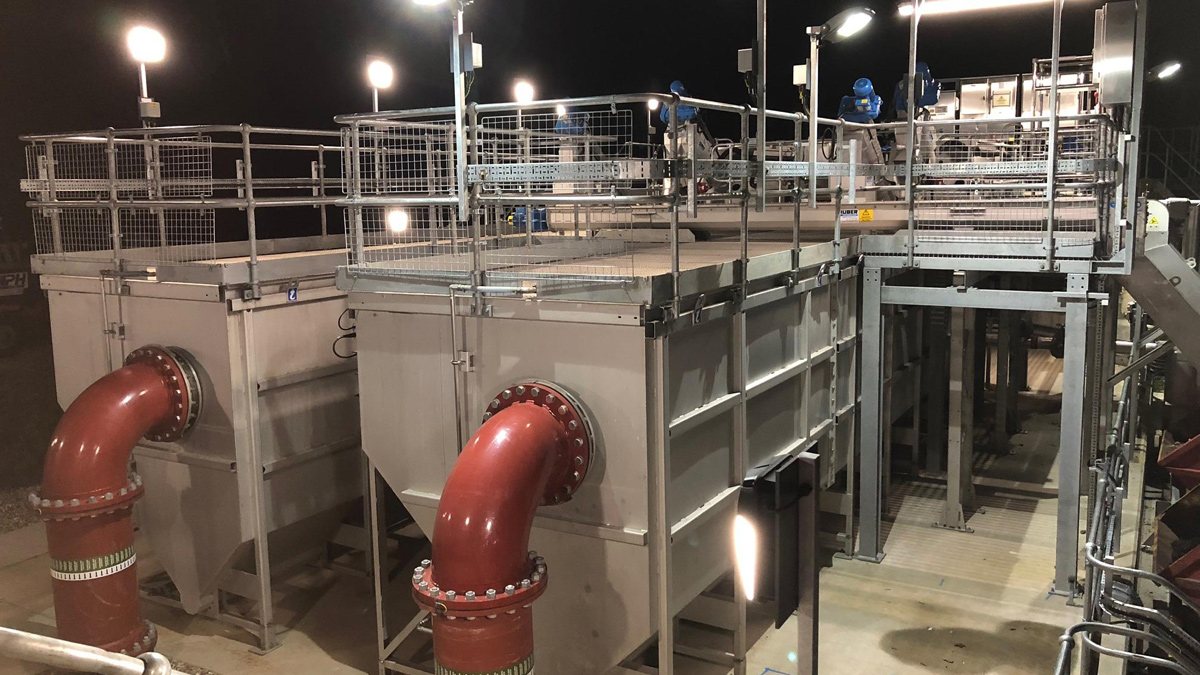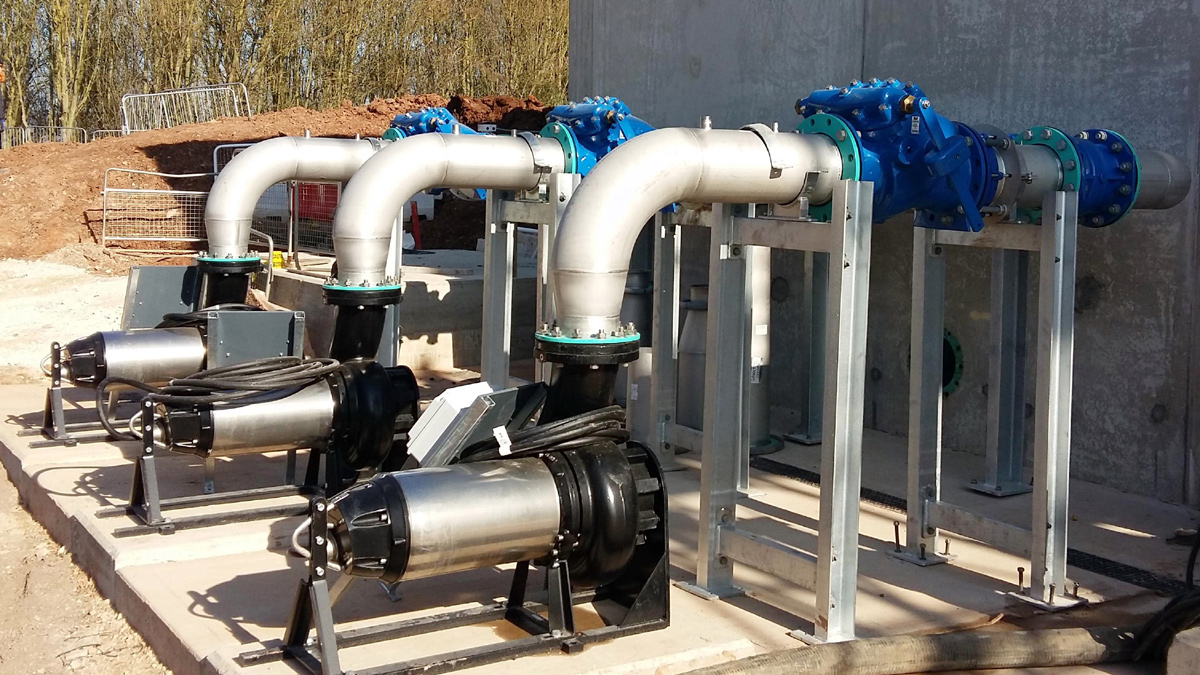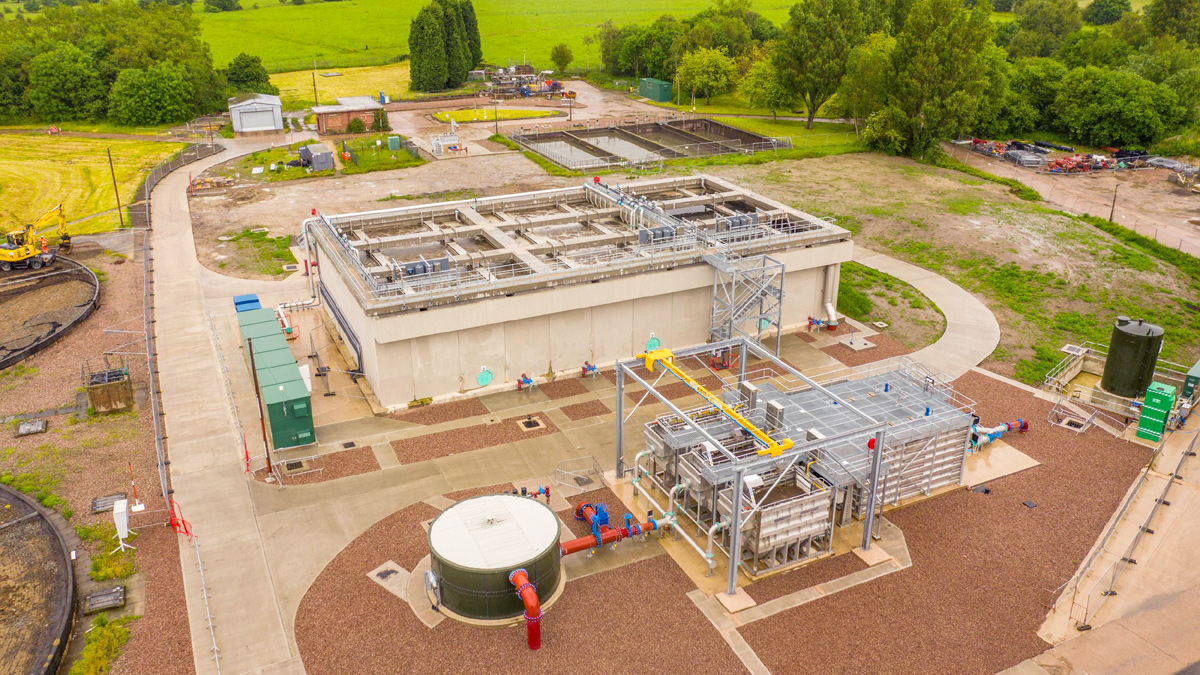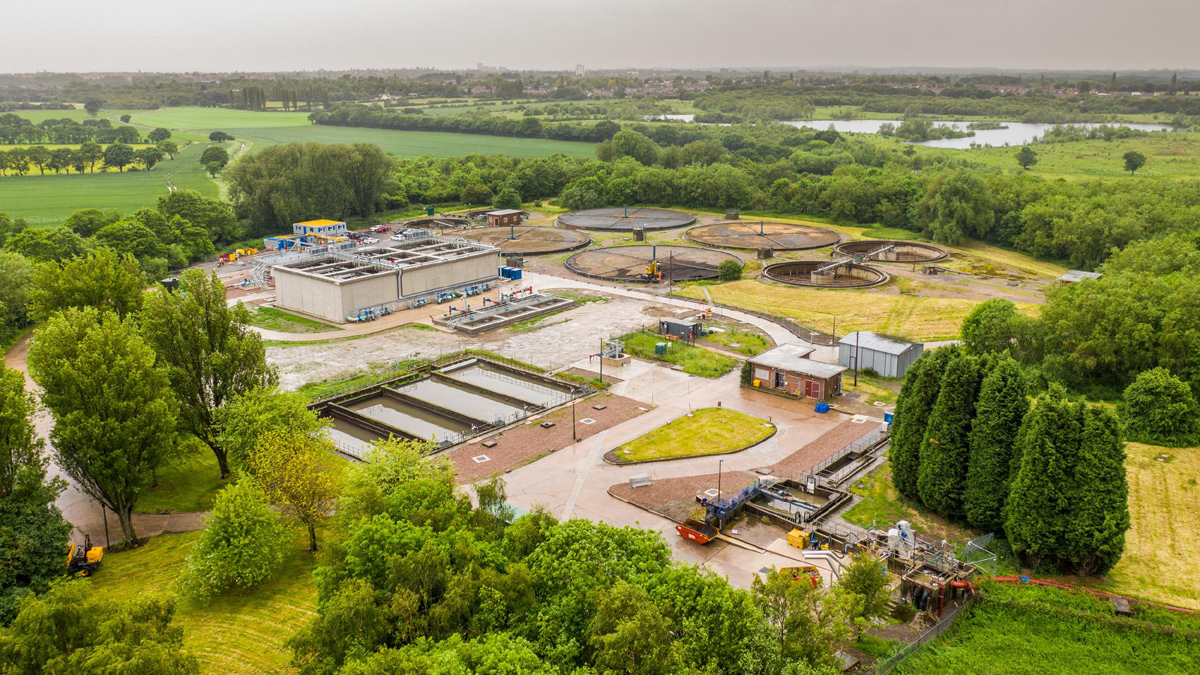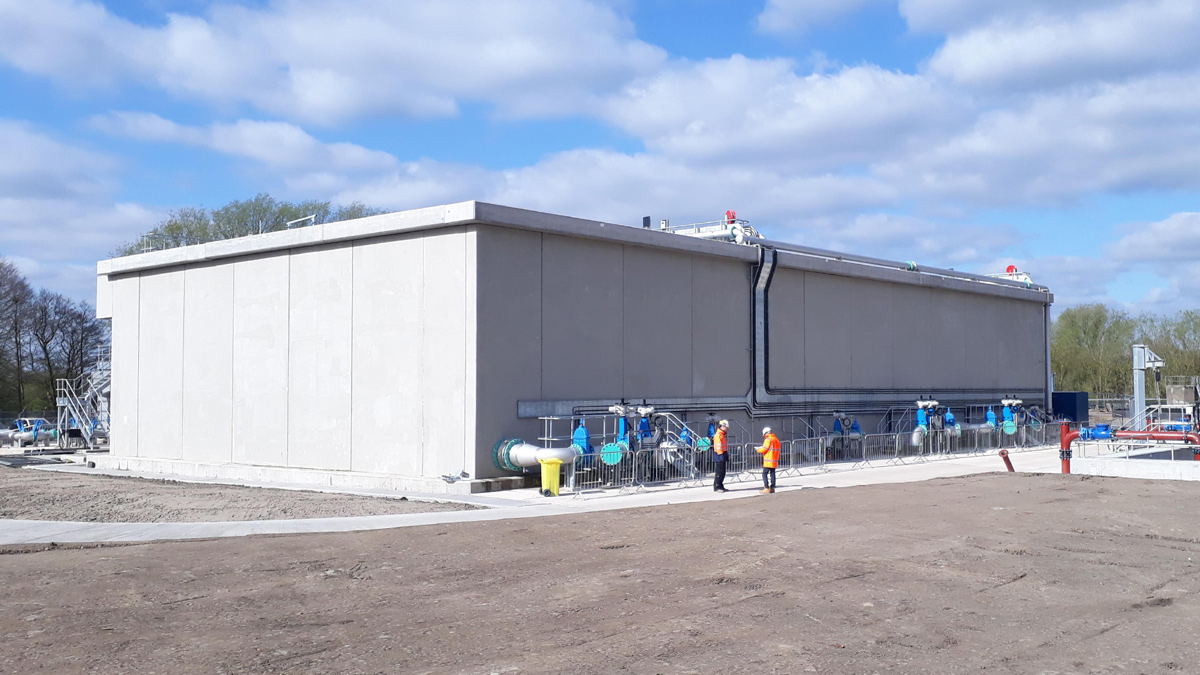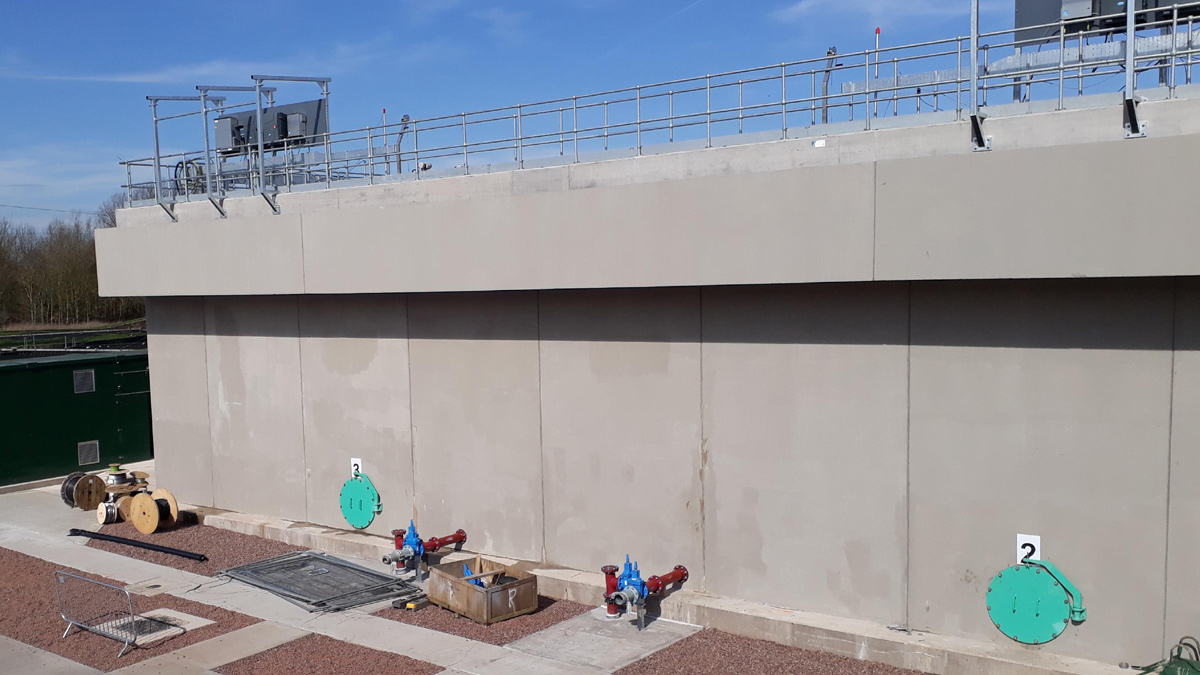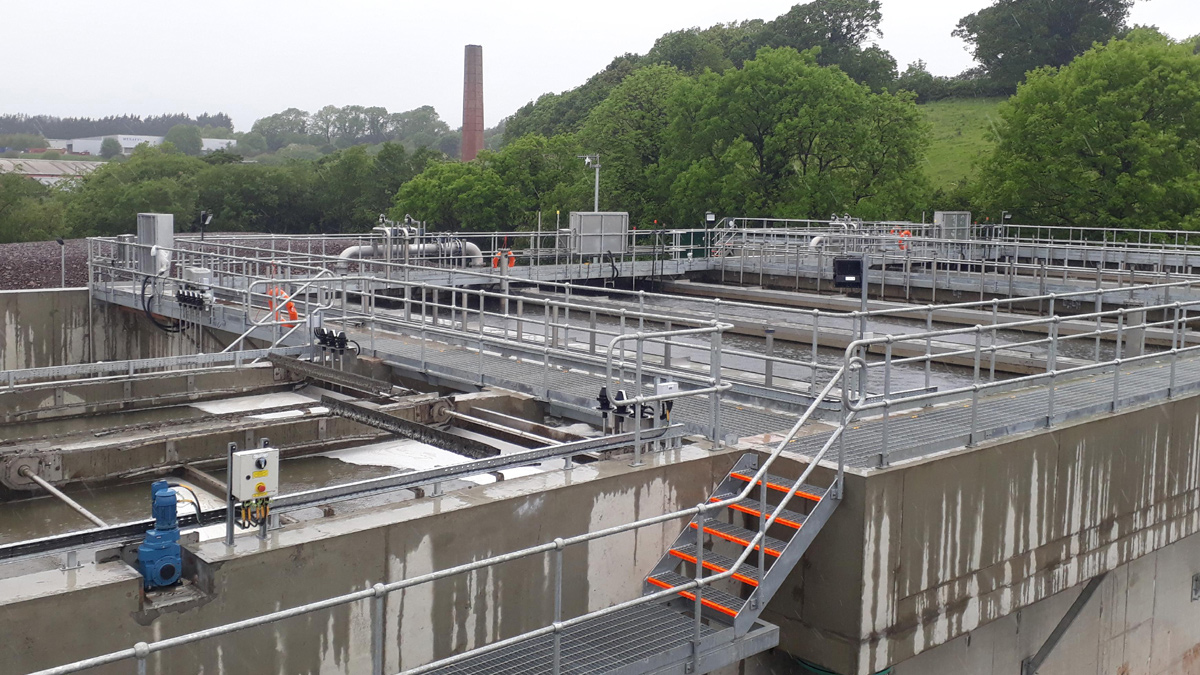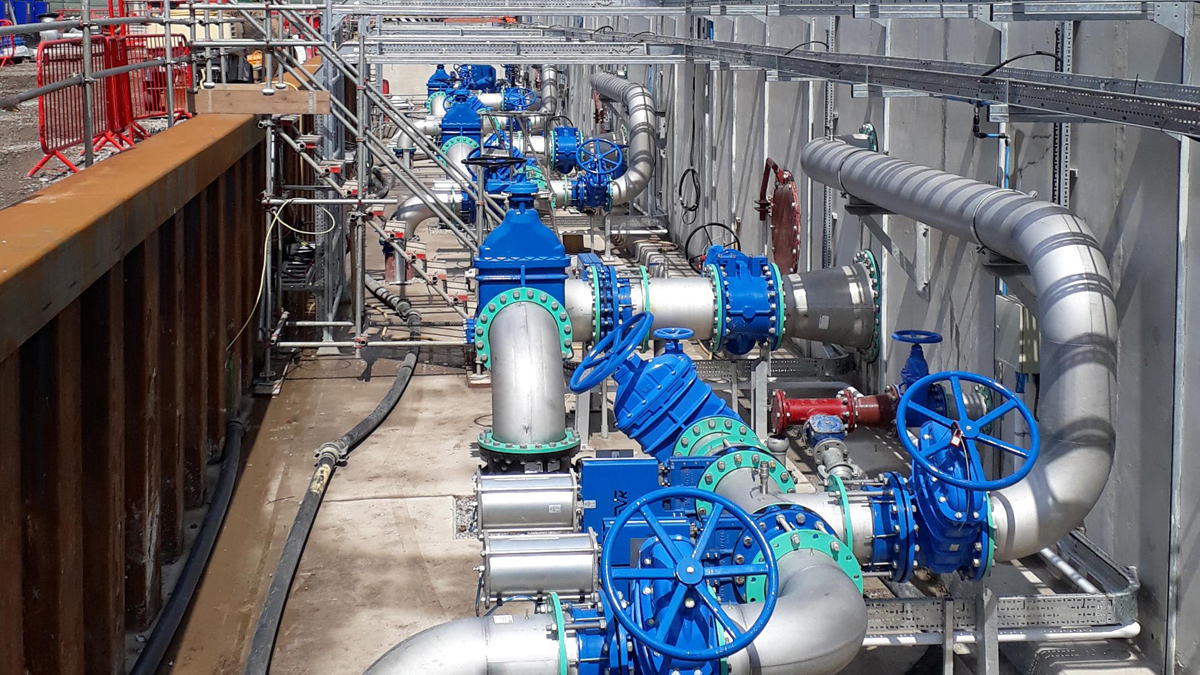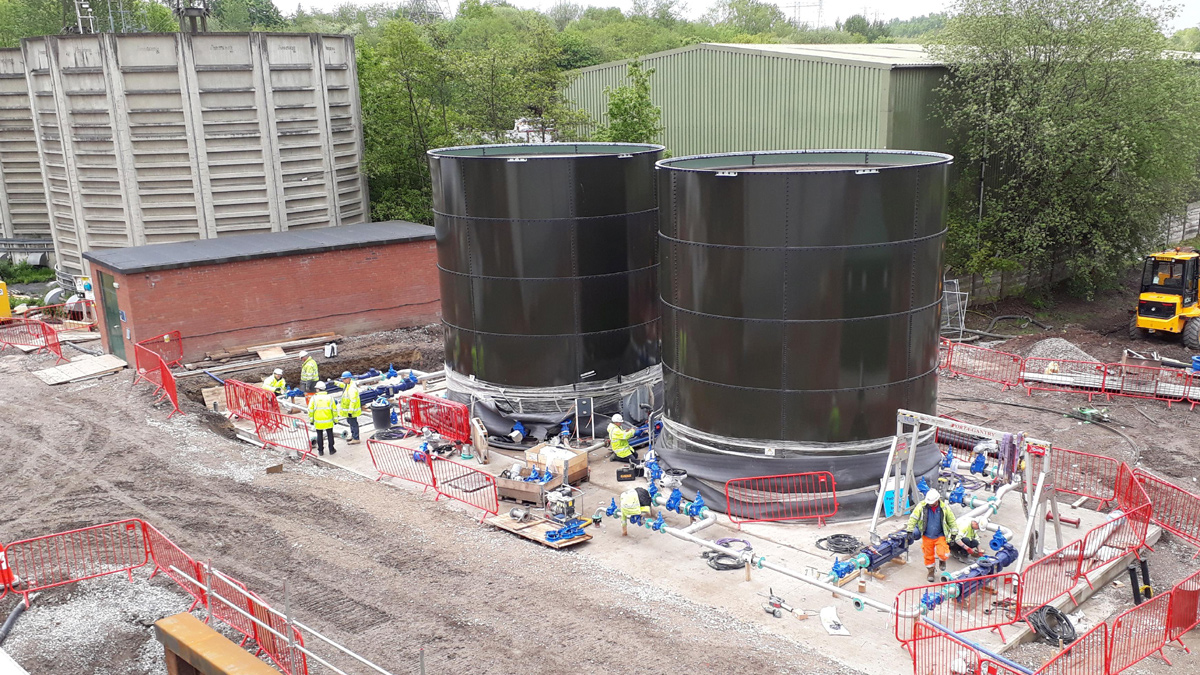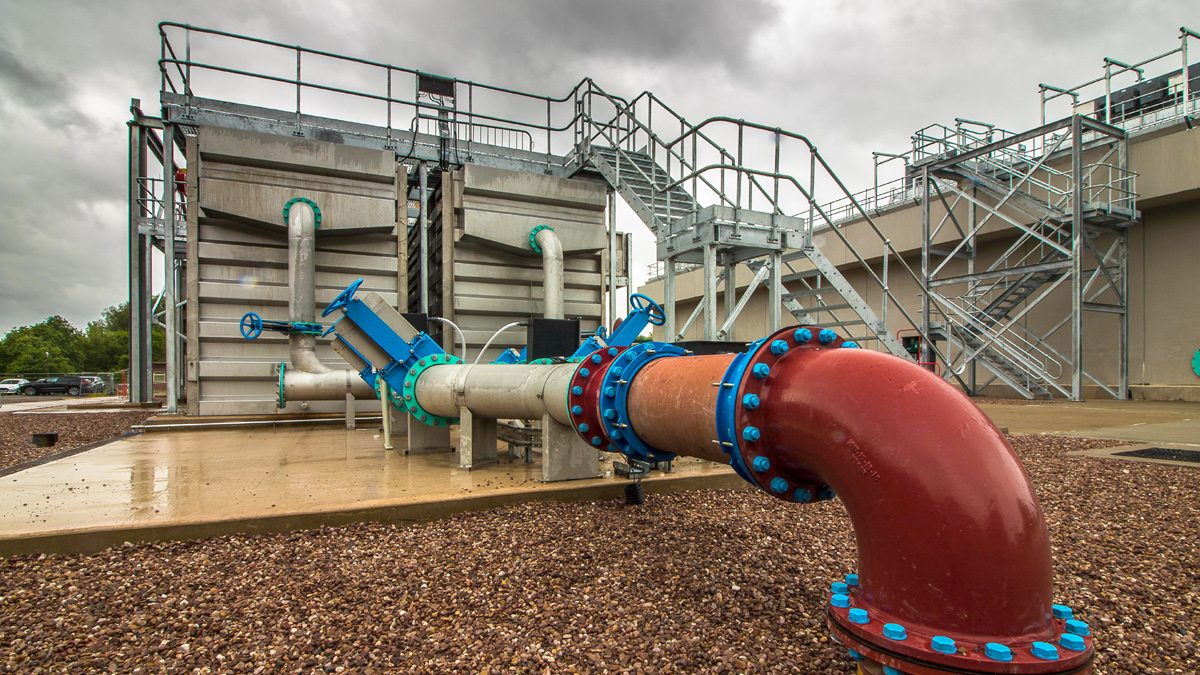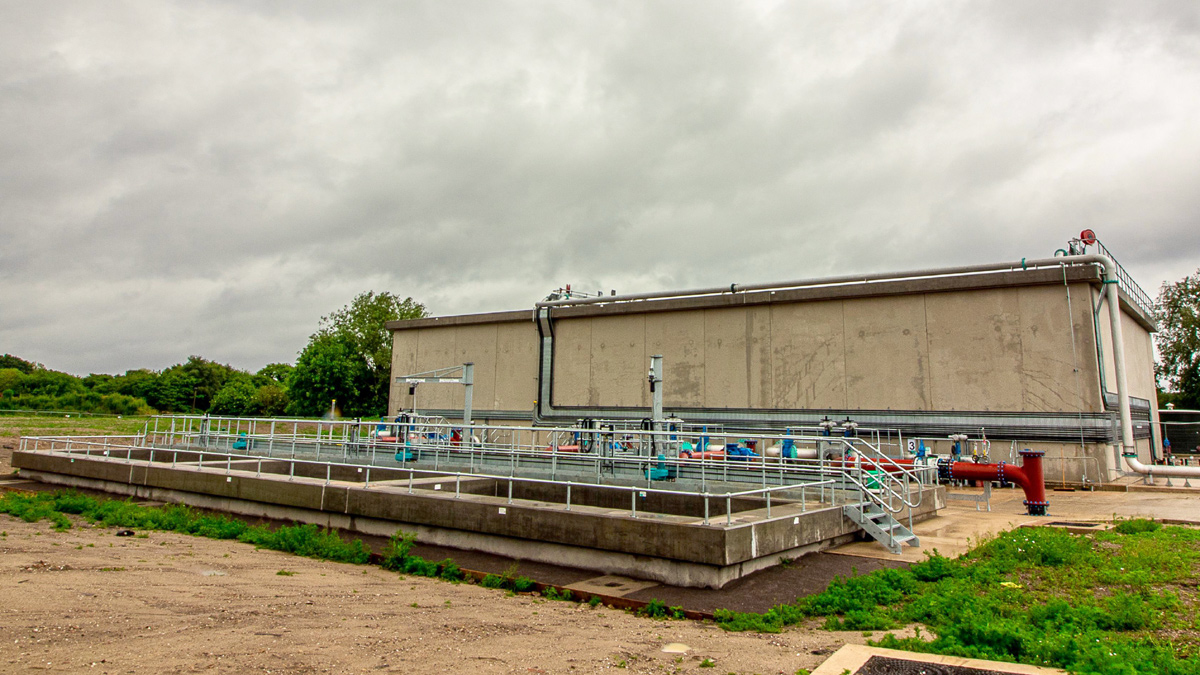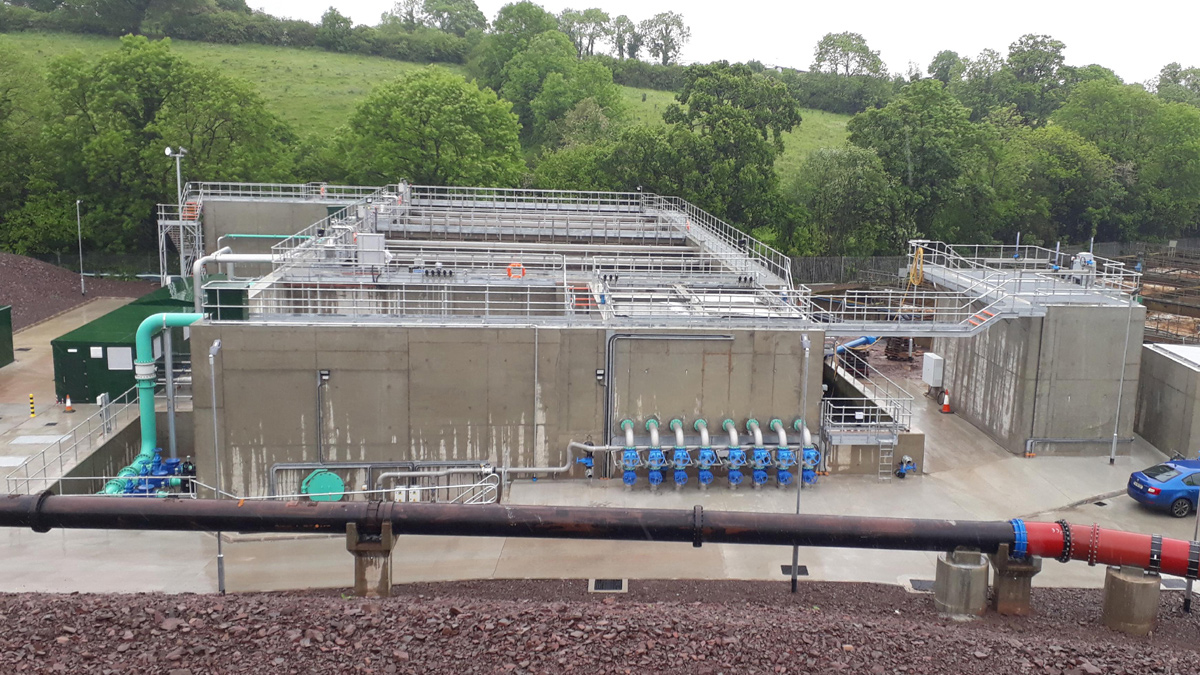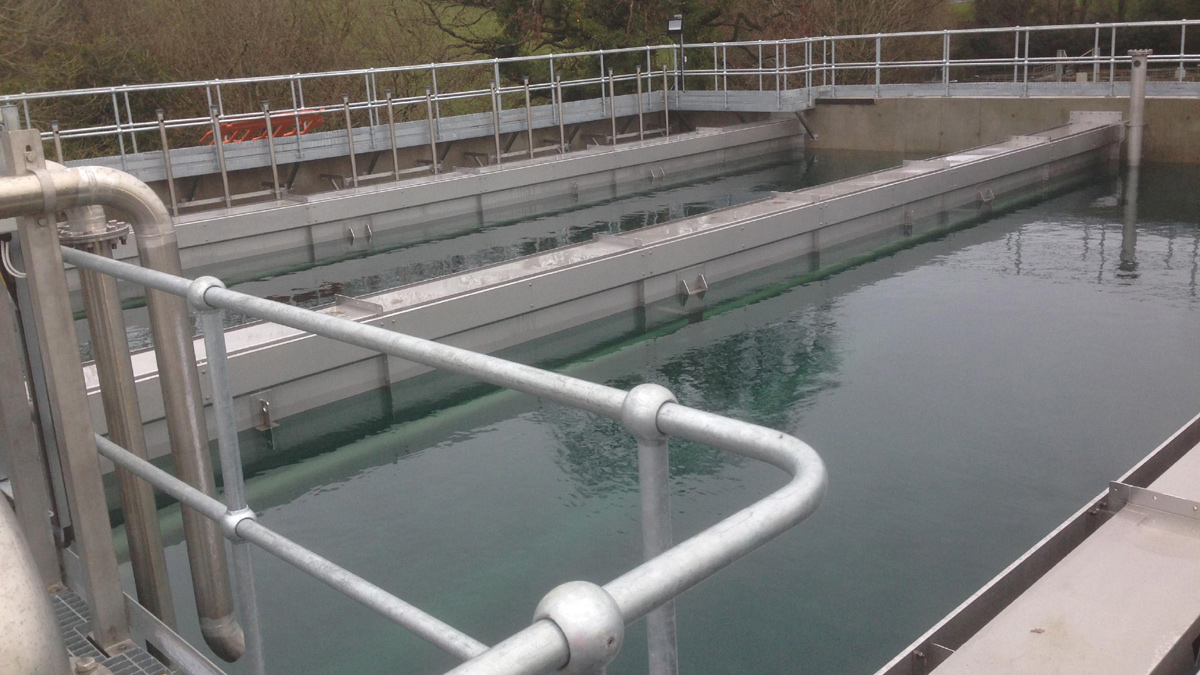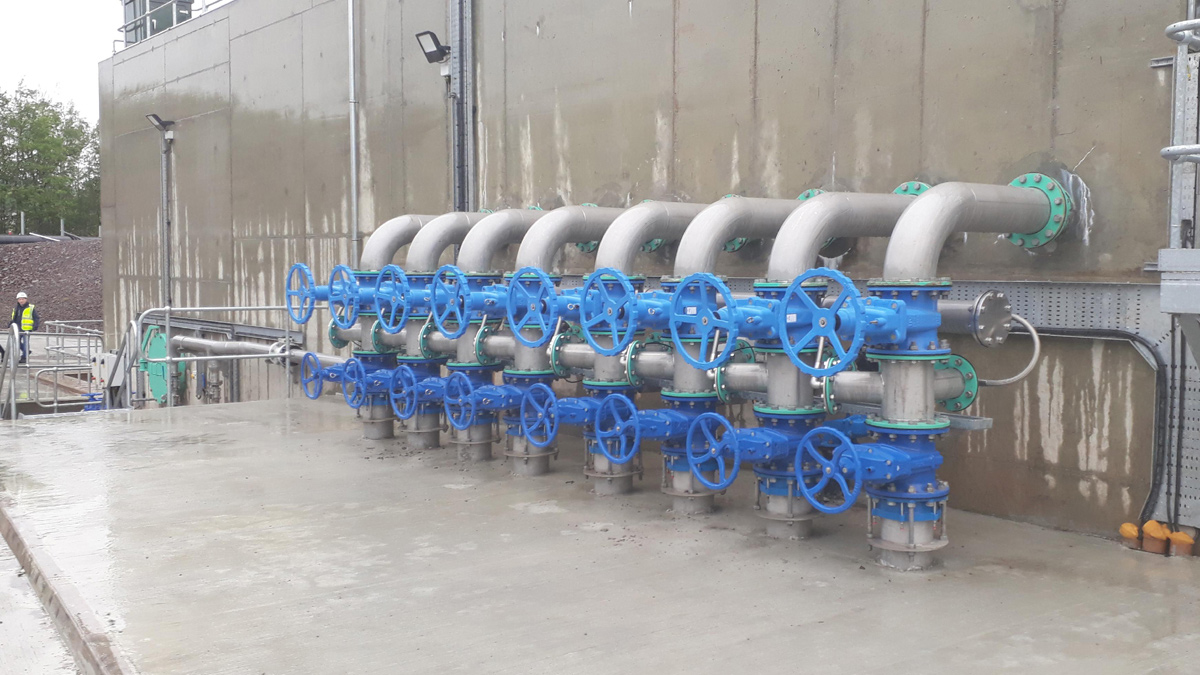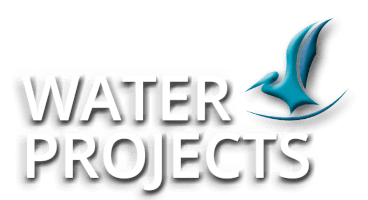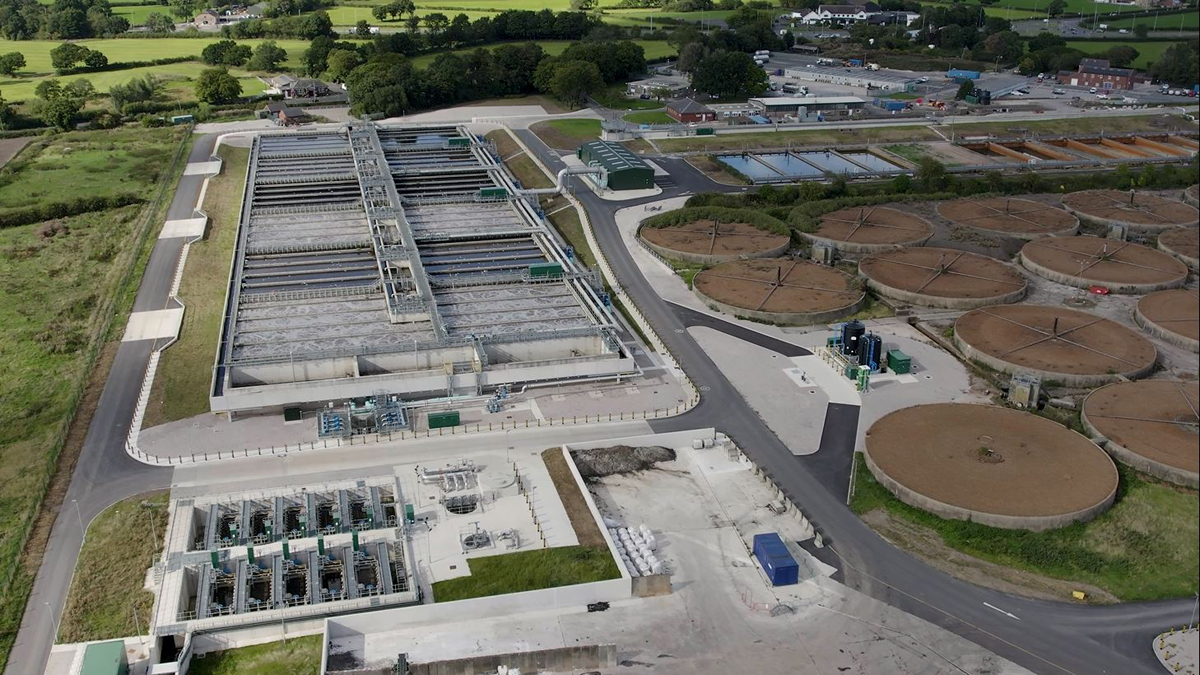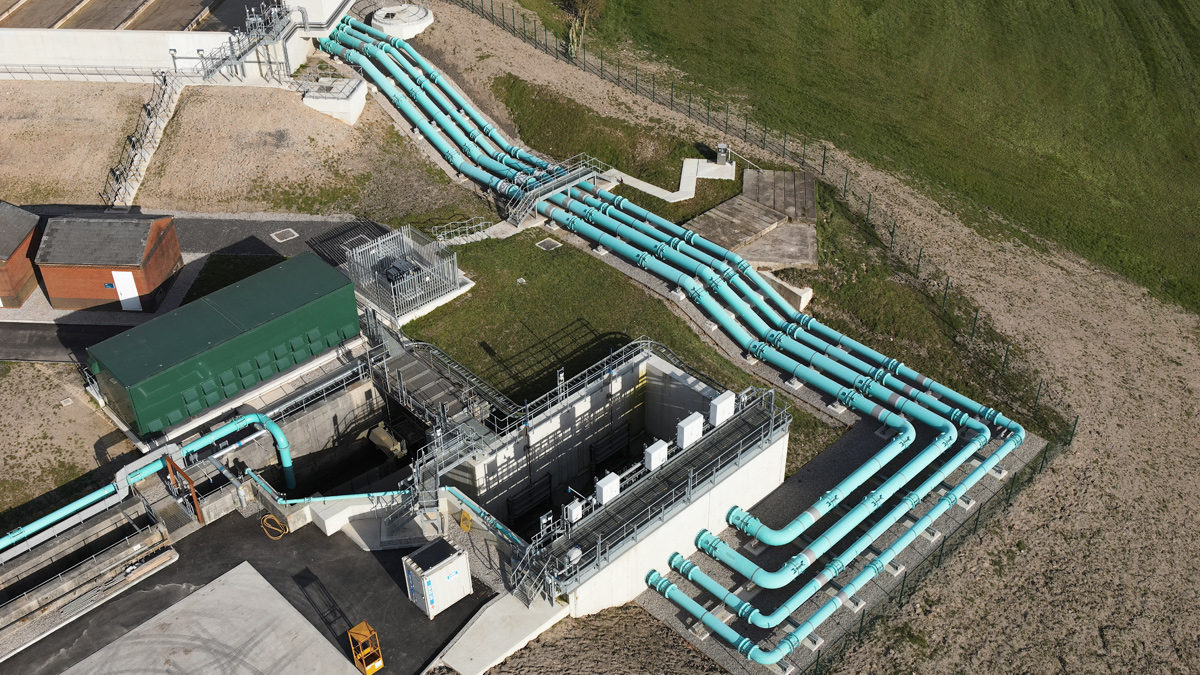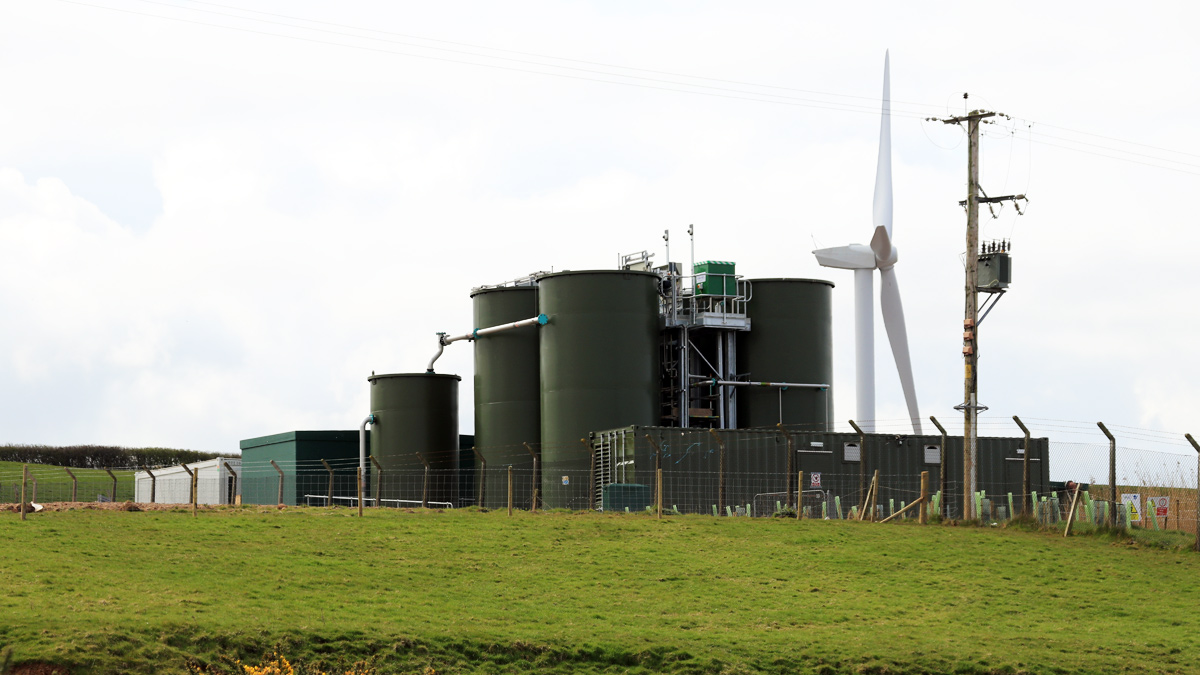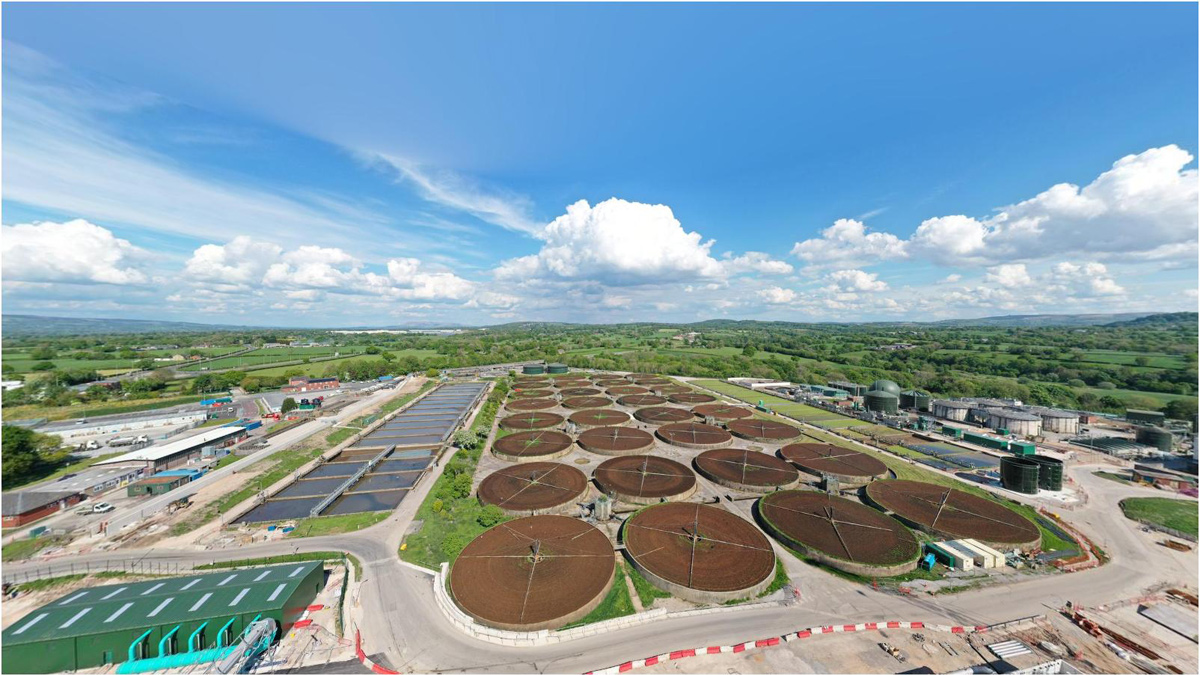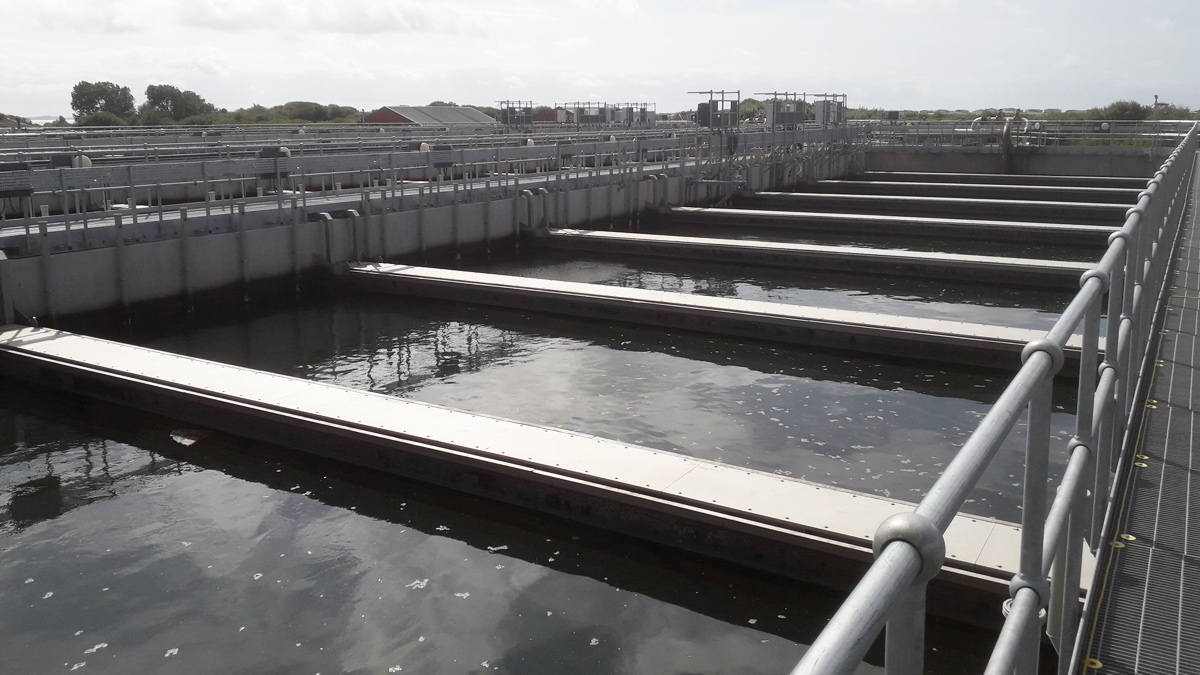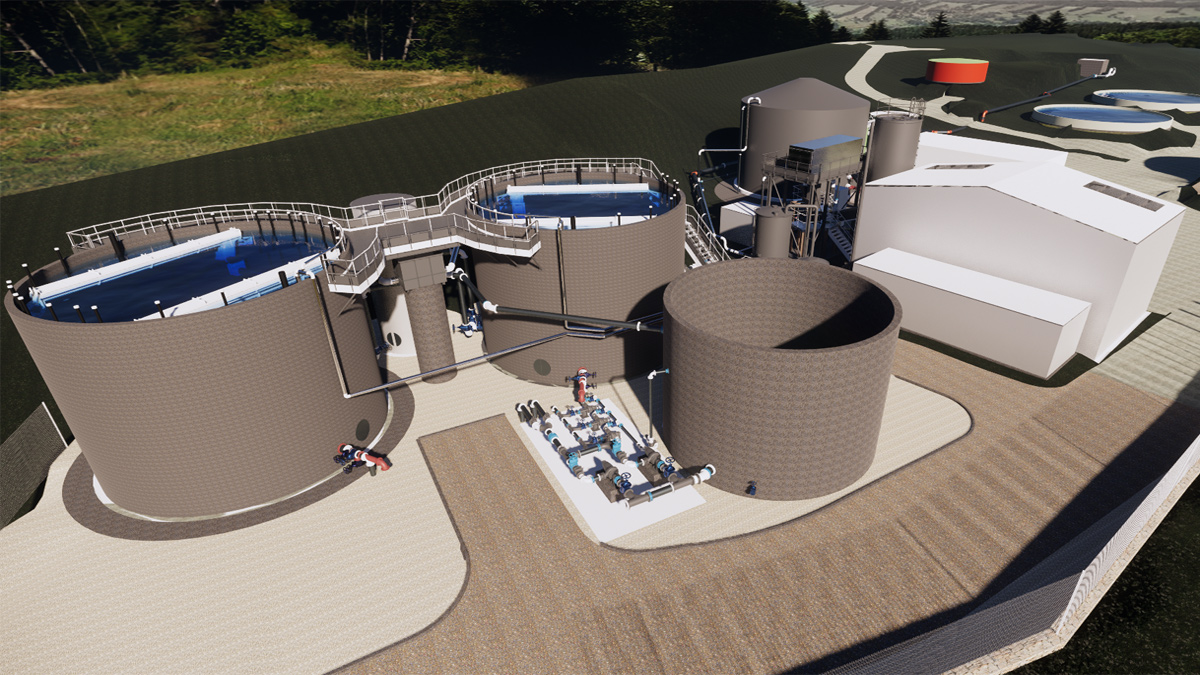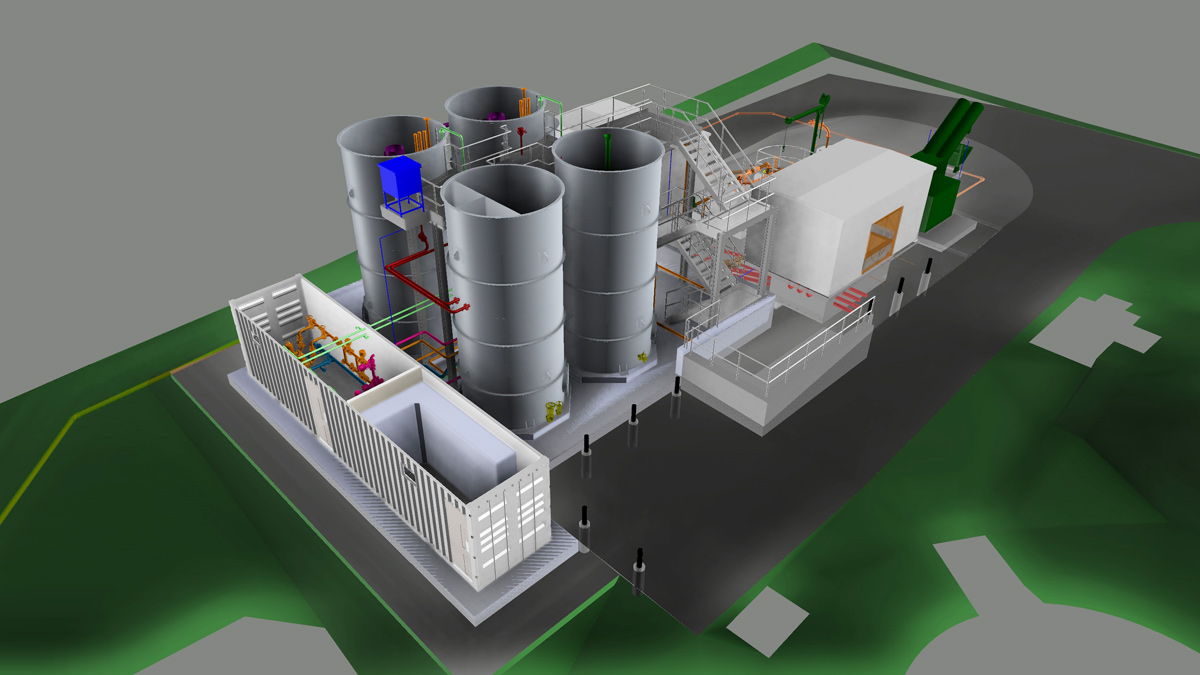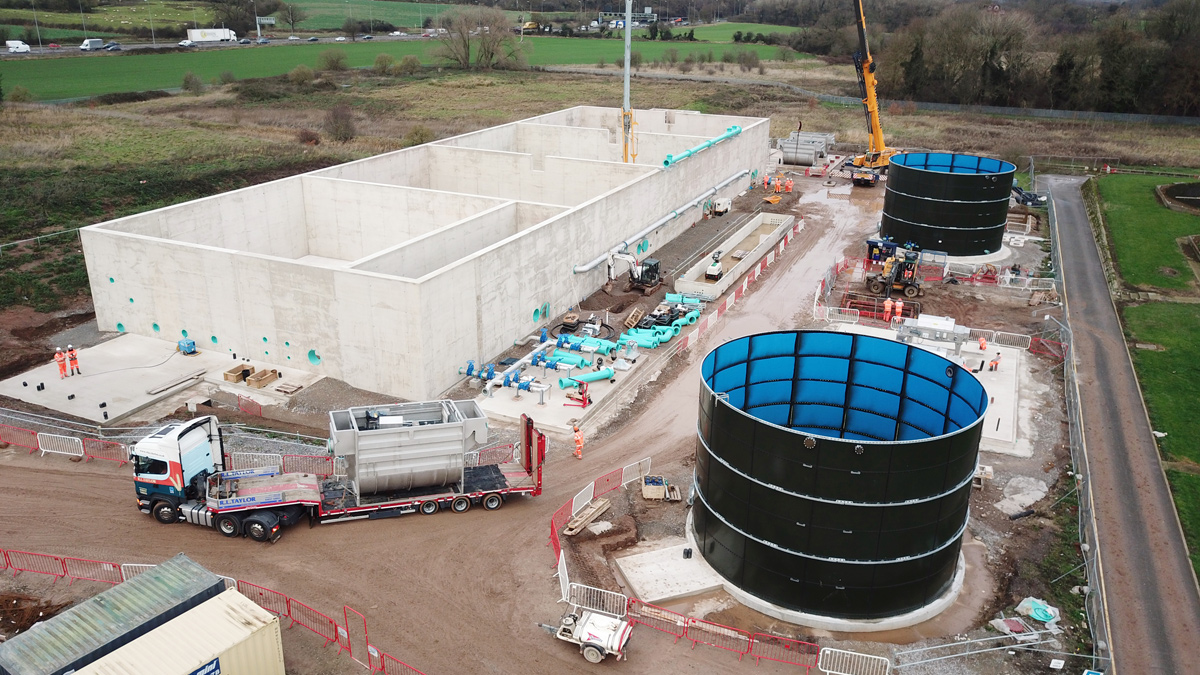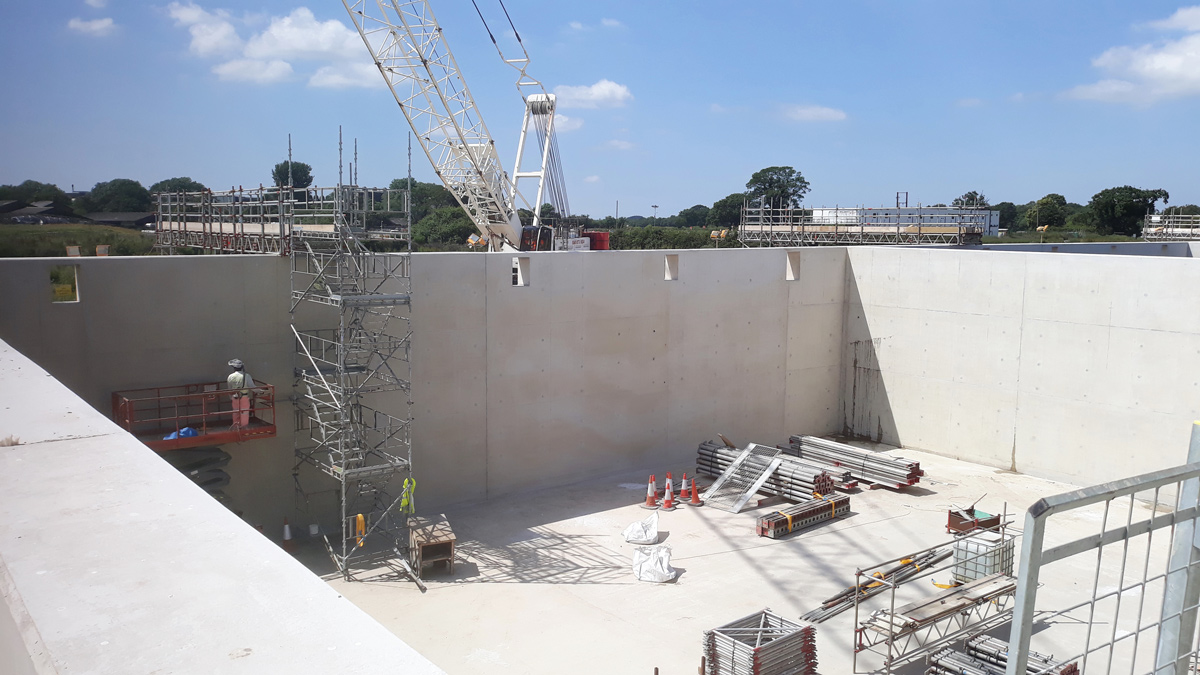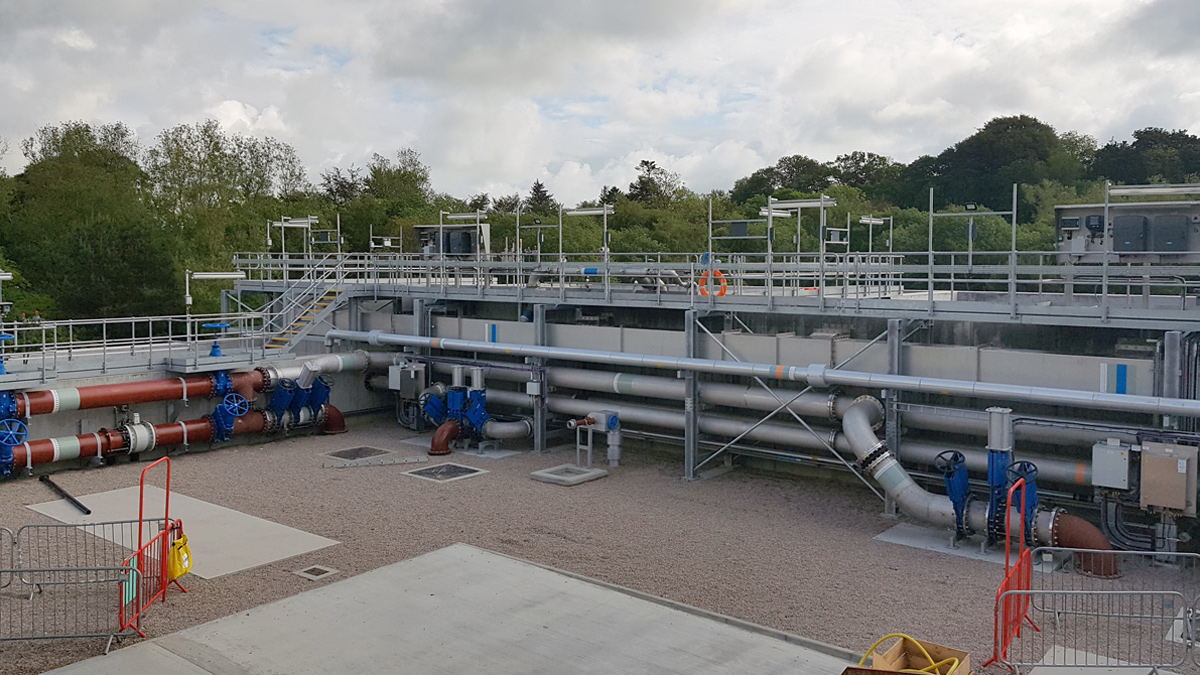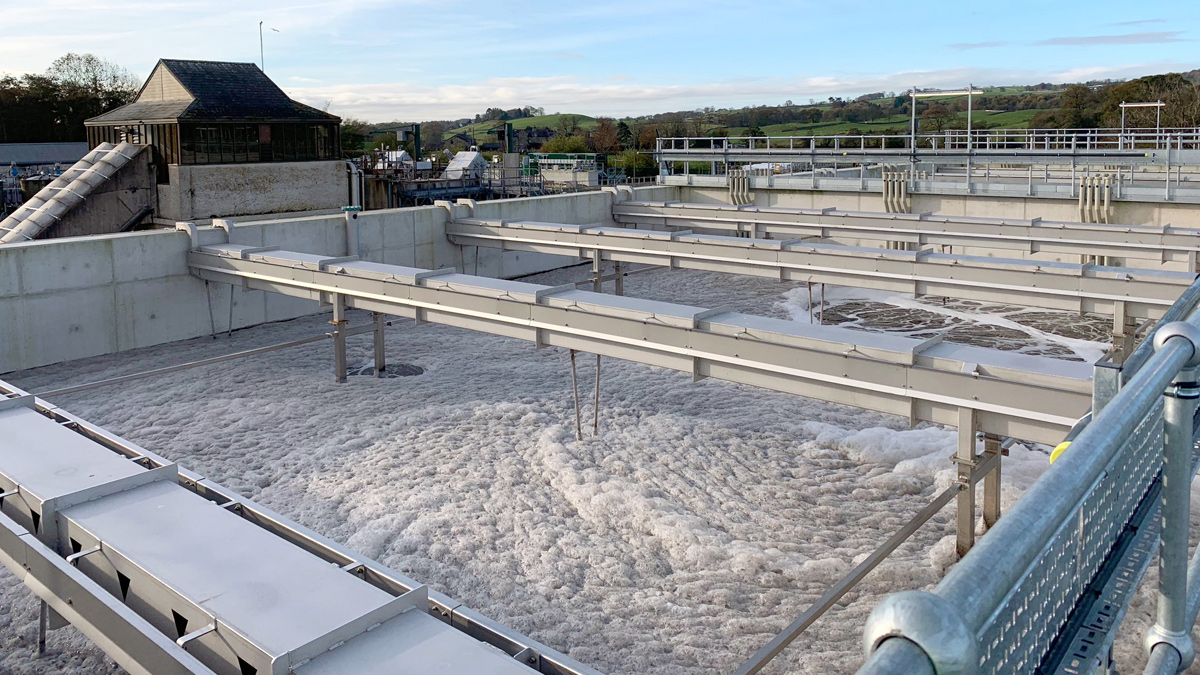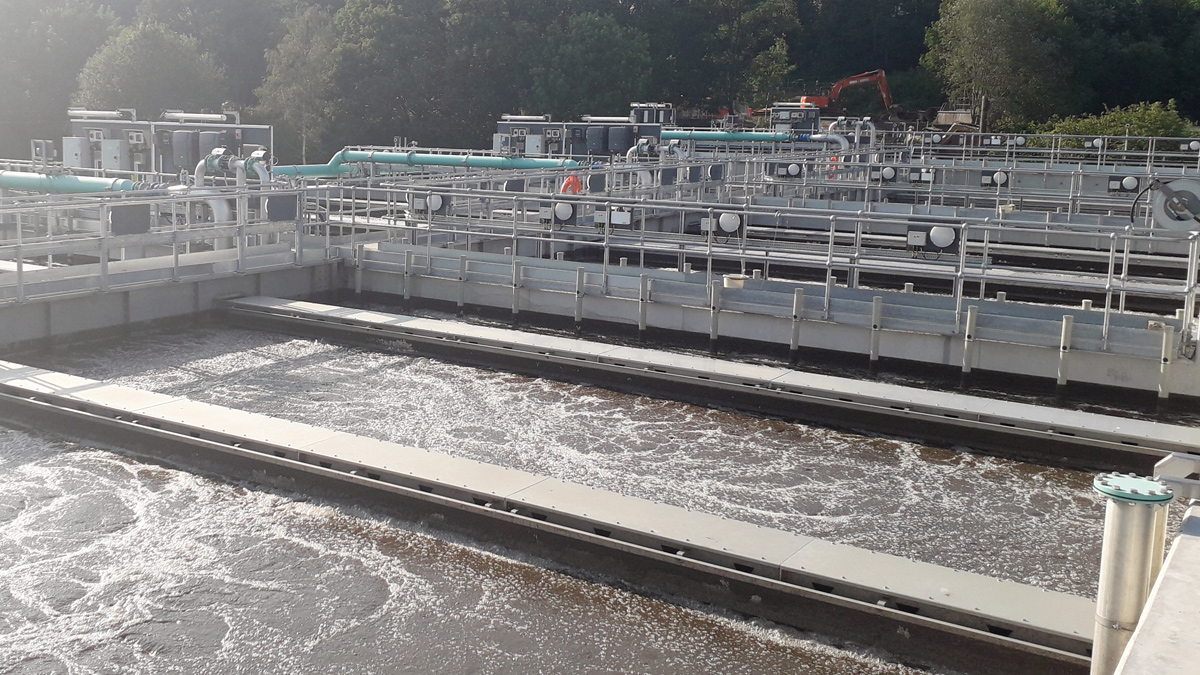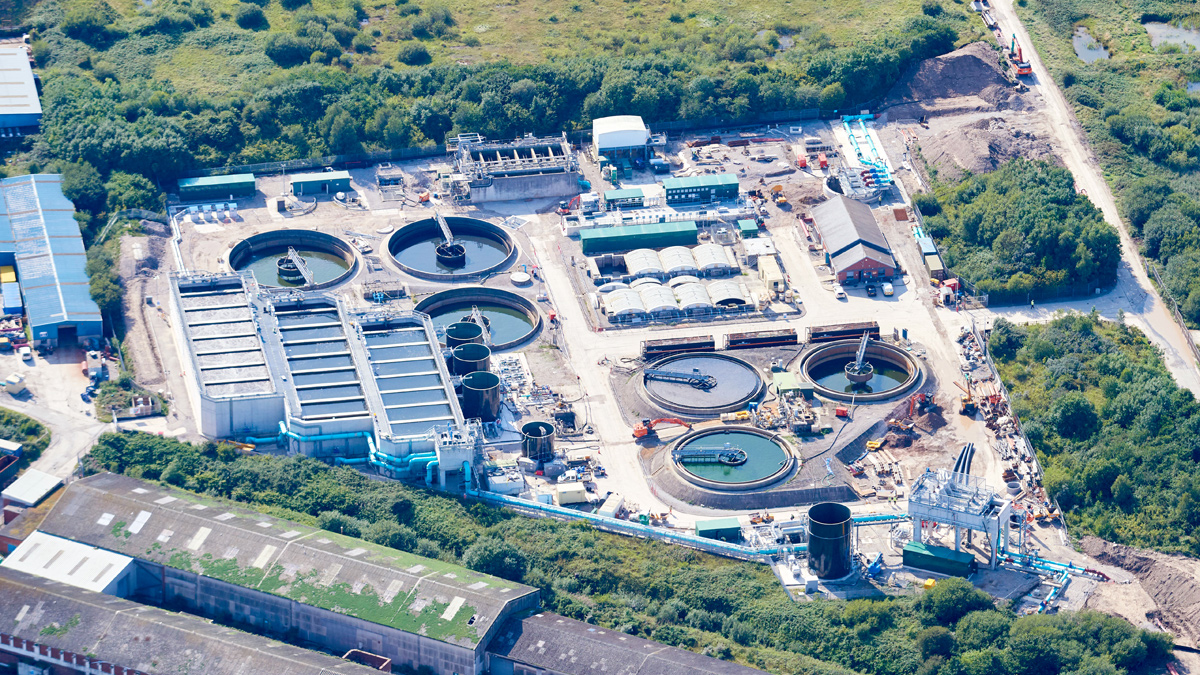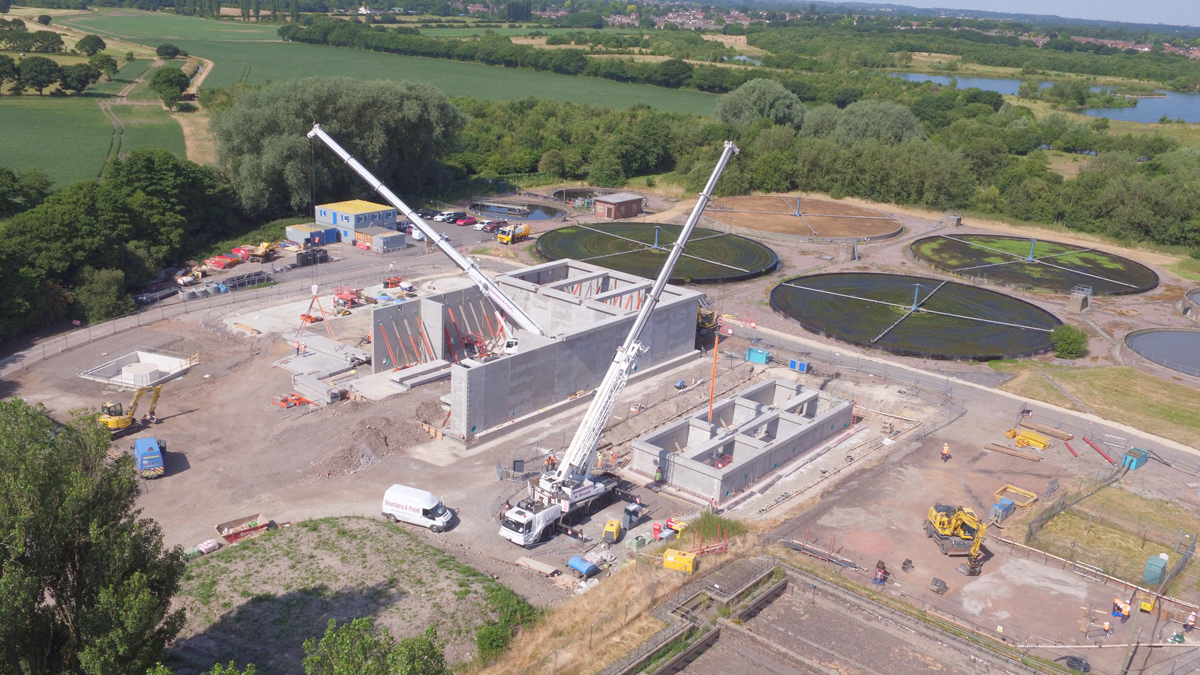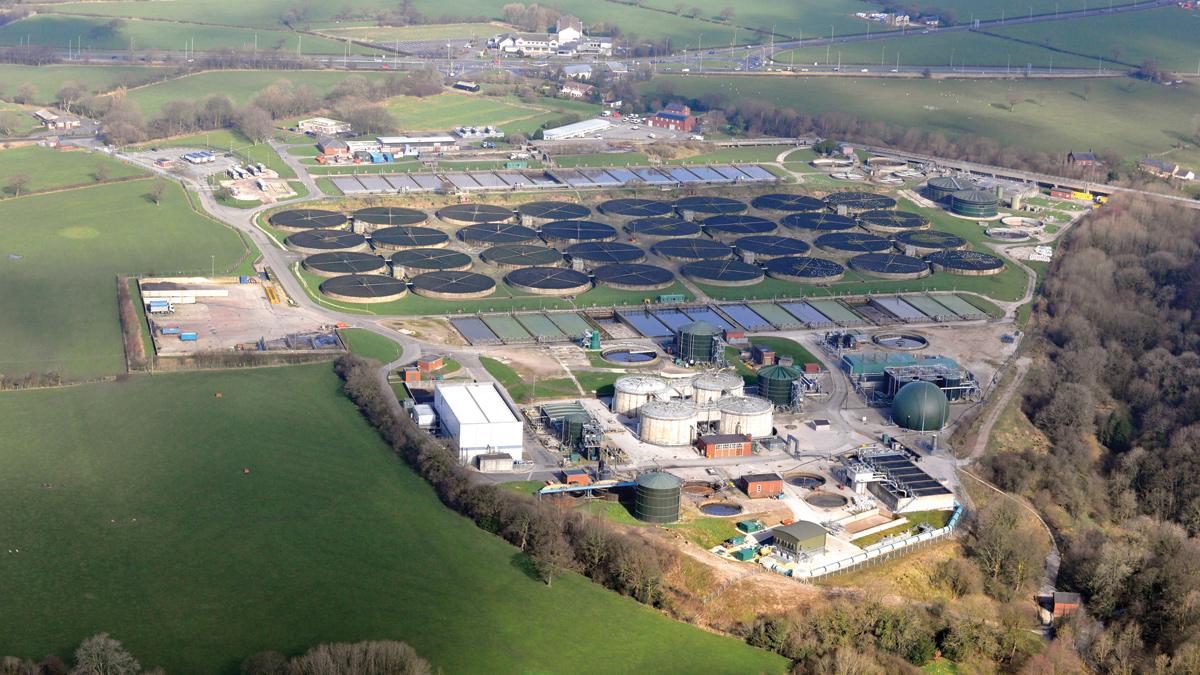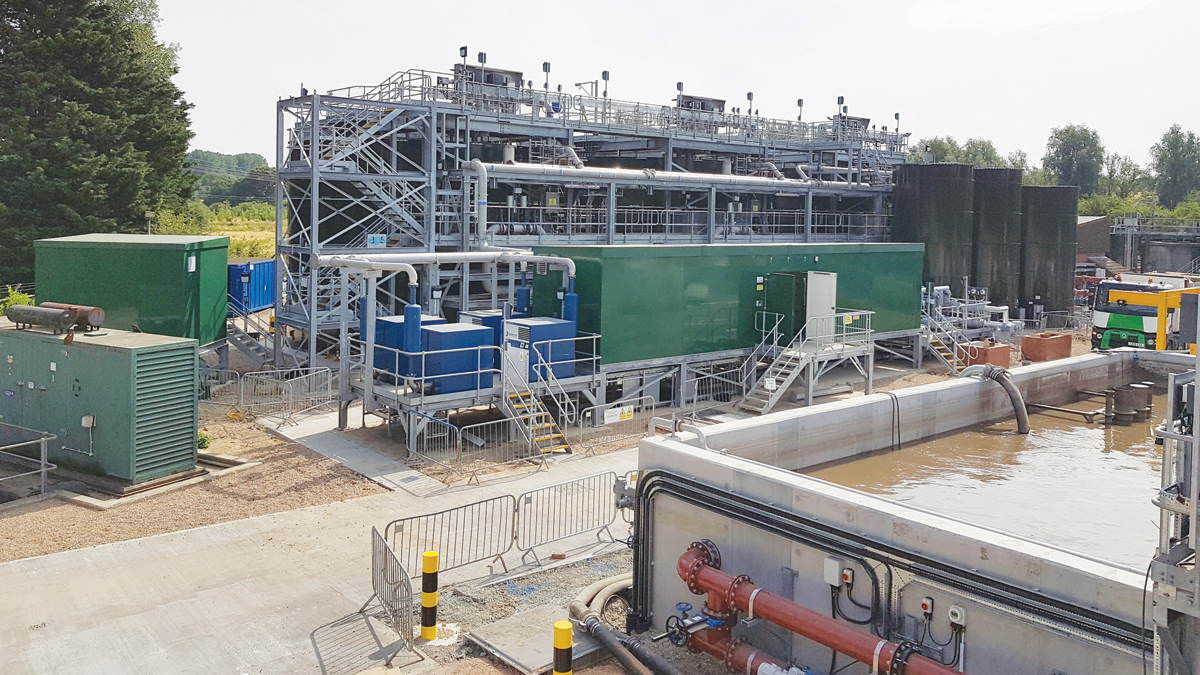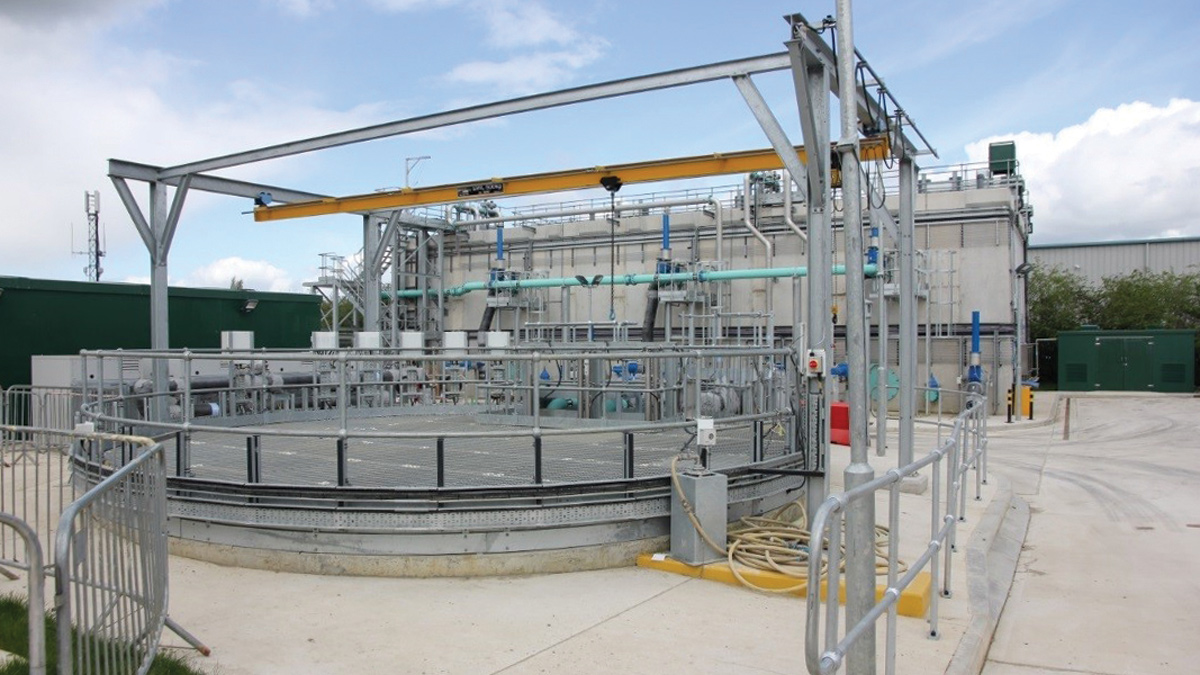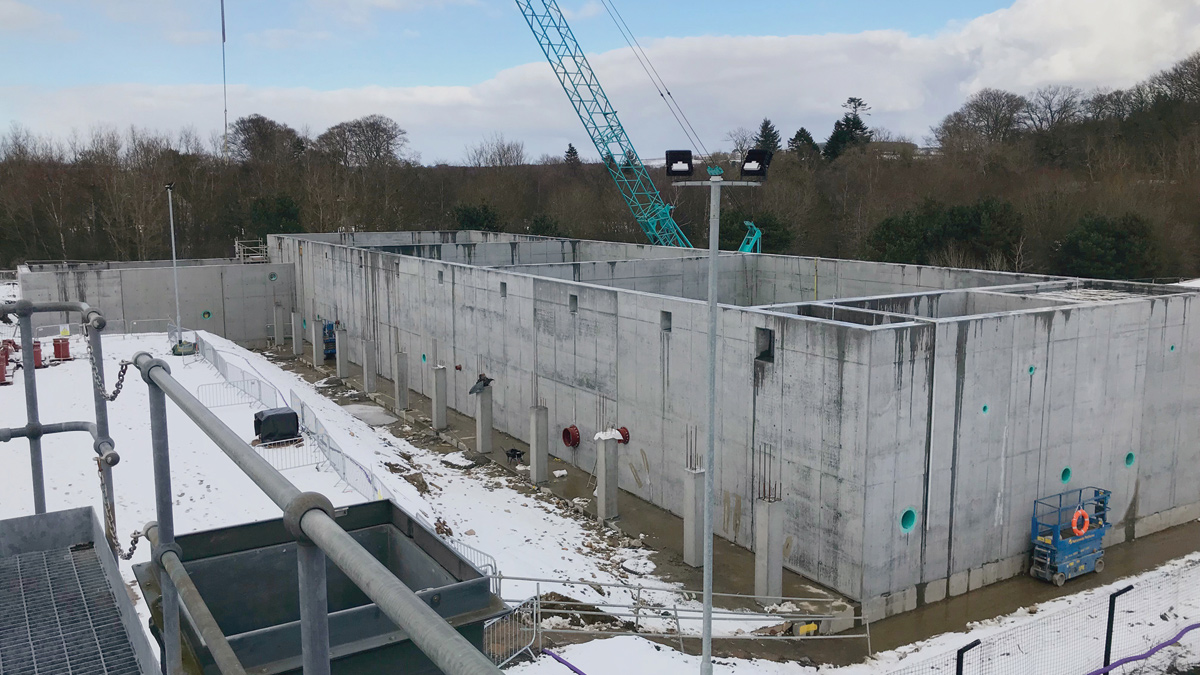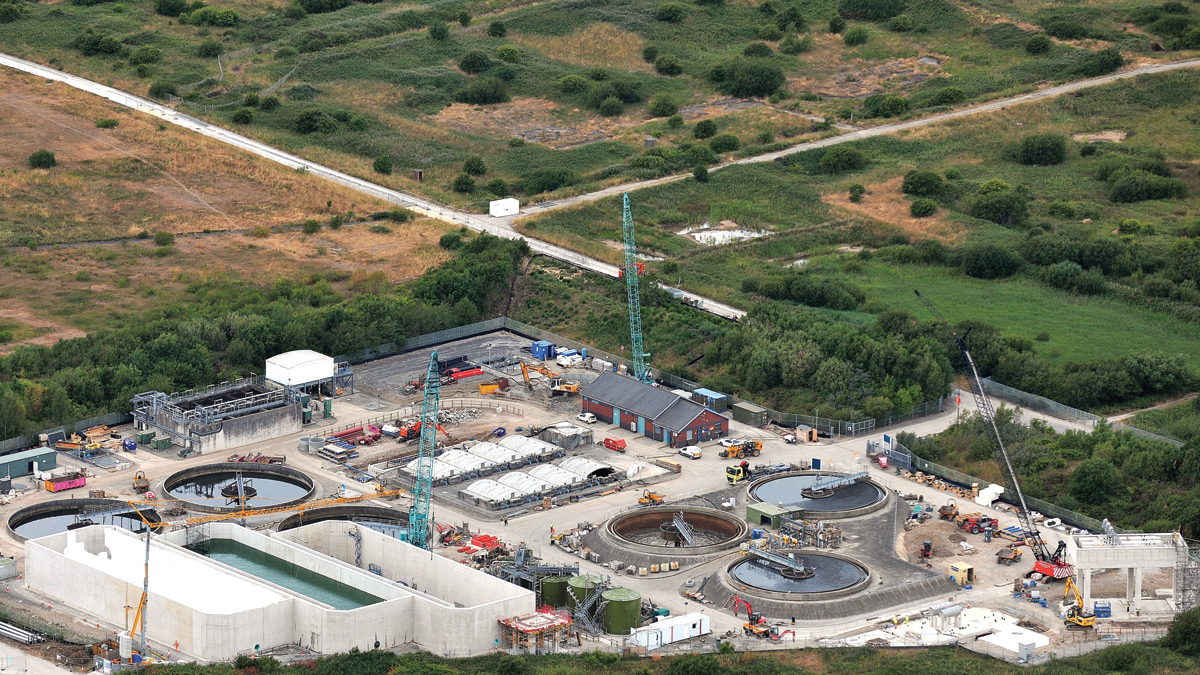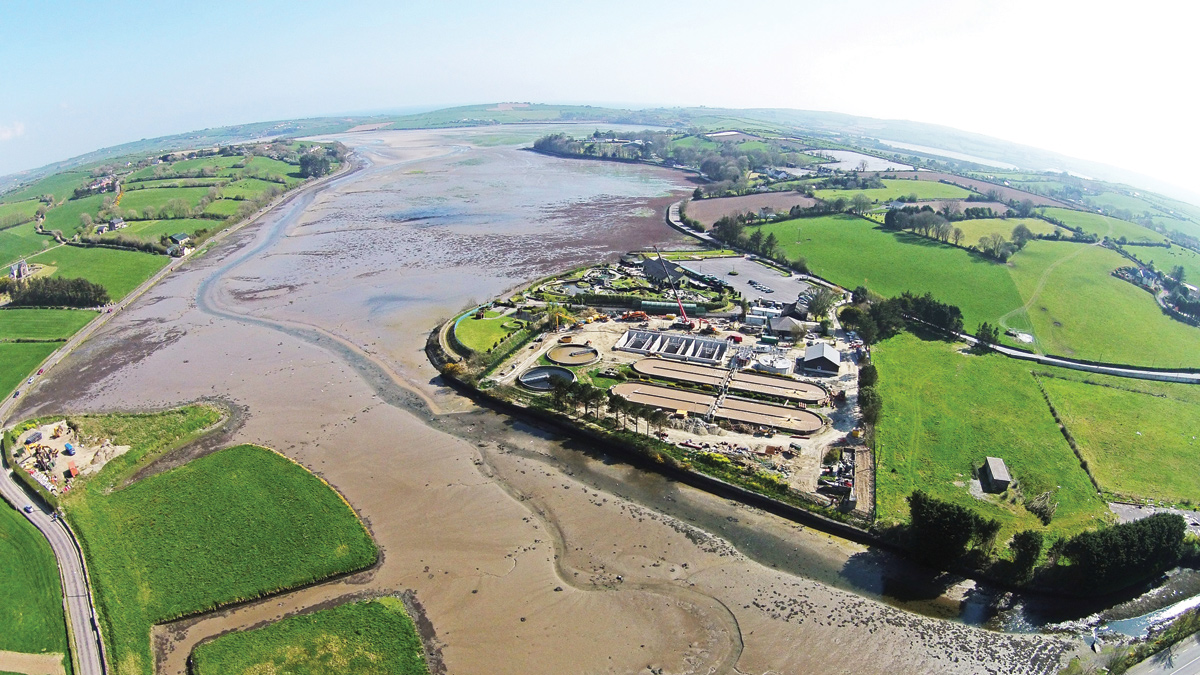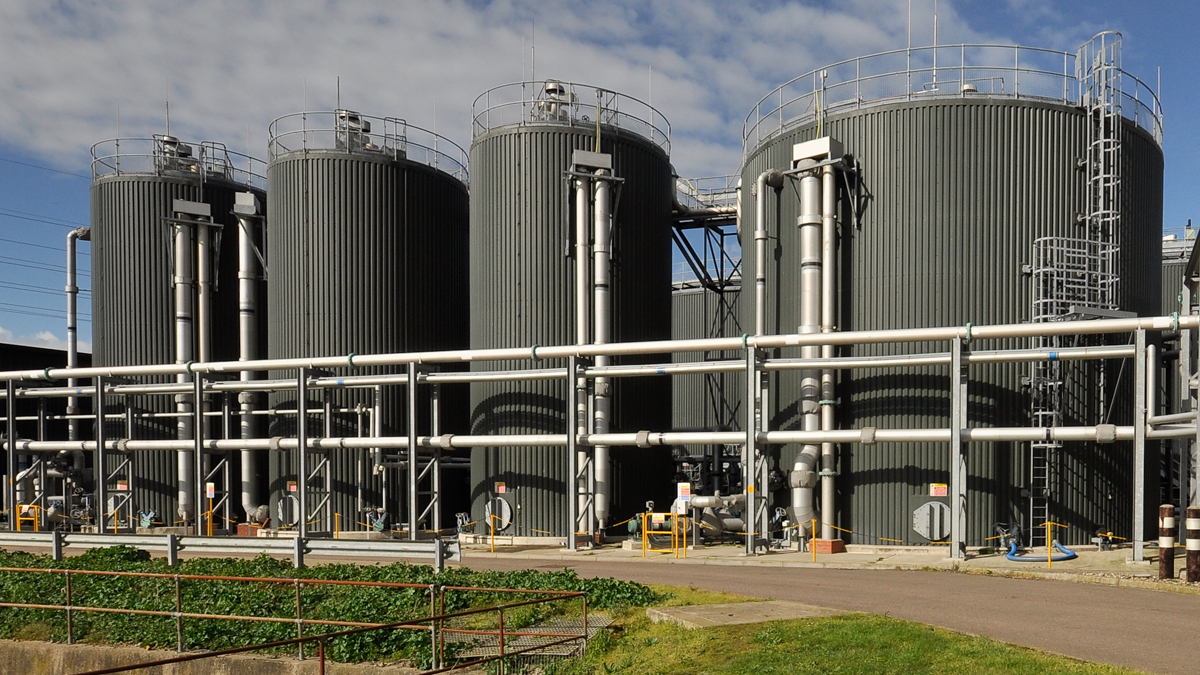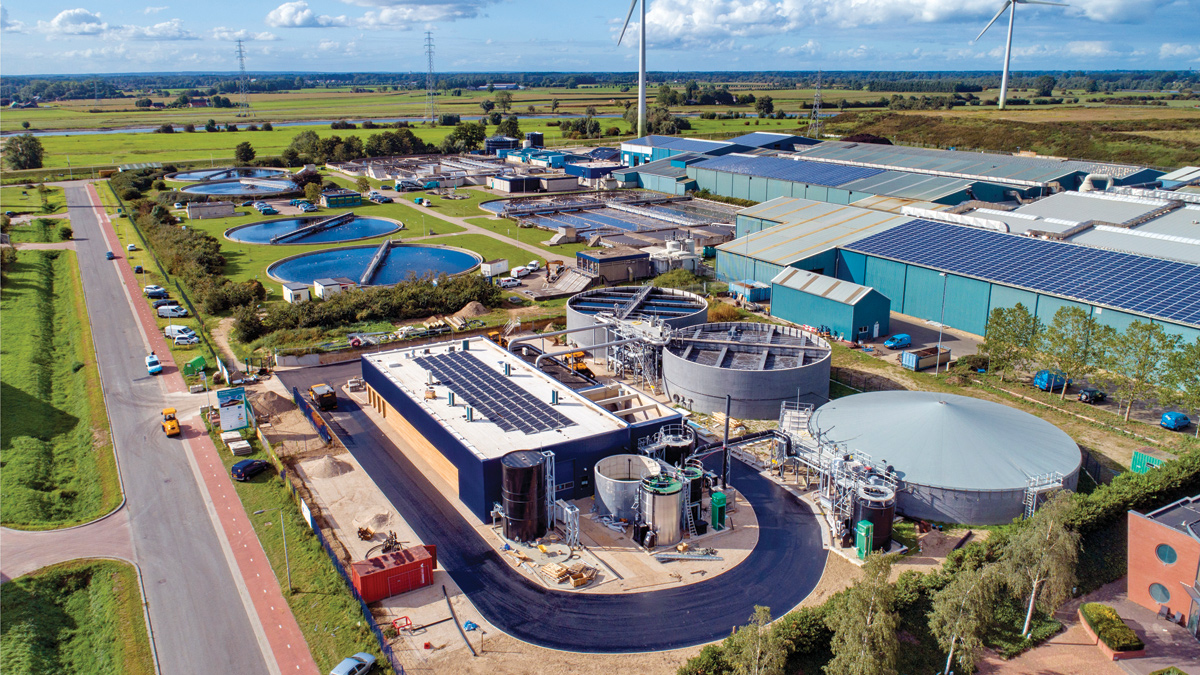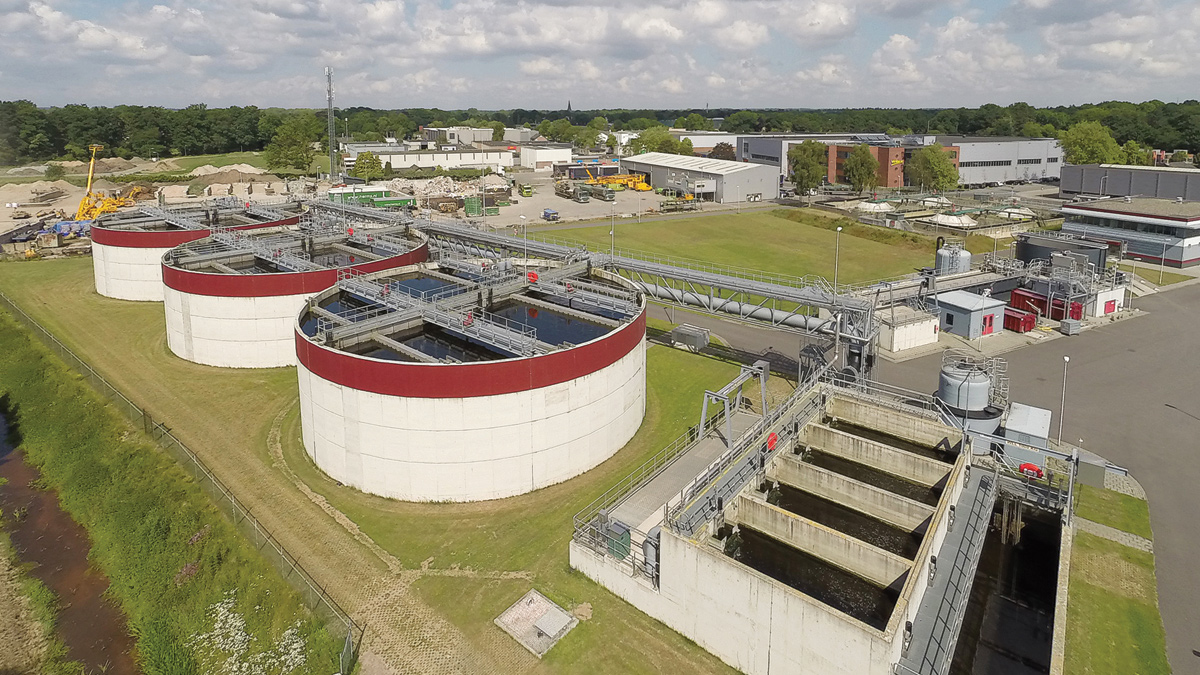Nereda
Nereda Package & Mini Plants (2020)
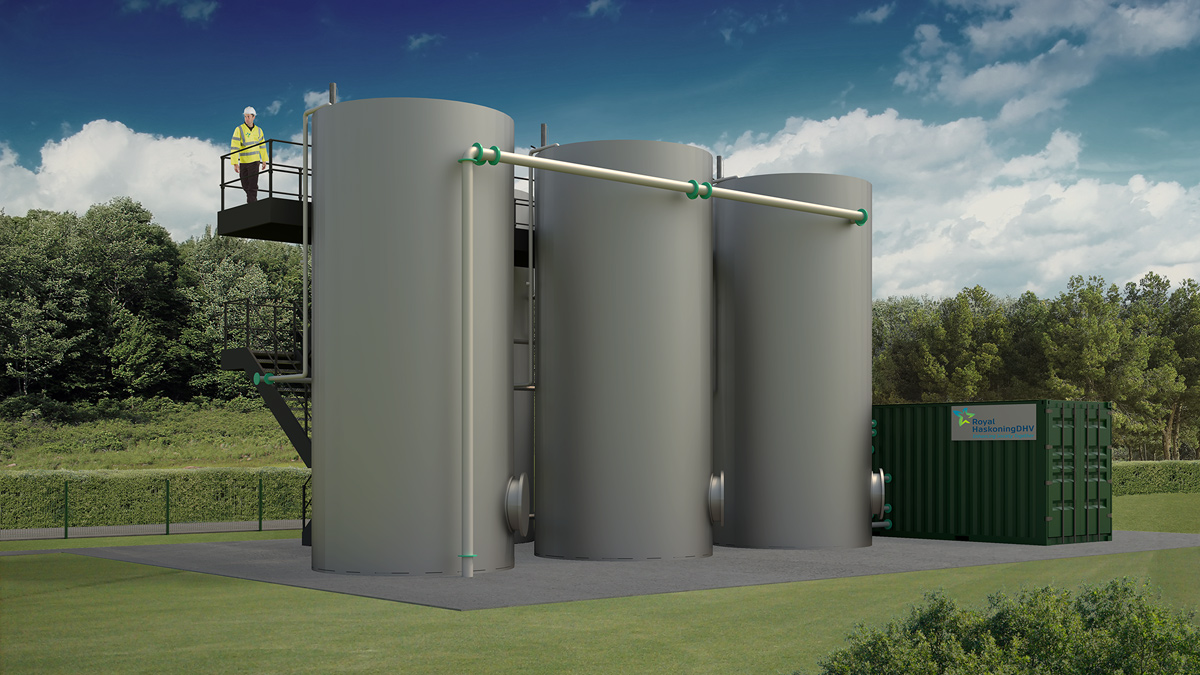
3D model of Nereda Package Plant - Courtesy of Royal HaskoningDHV
The start of AMP 7 brings several new challenges for the UK water industry, not least of them being the increasingly tighter treated water consents for both nitrogen (N) and particularly total phosphorus (TP). With many of the works that this affects serving smaller populations, a cost-effective and sustainable solution with little or no dependency on chemical dosing is needed. Royal HaskoningDHV’s award winning Nereda® technology has already been adopted by several UK water companies for sustainable wastewater treatment including biological phosphorus removal, but the process has previously been designed and developed for each site on a bespoke basis, and until now, has not generally been thought to be cost-efficient for plants serving populations below 10,000. With 11 Nereda plants now operational in the UK and four more in Ireland, Royal HaskoningDHV has listened to customers, responded to the demand and developed a standardised range of Nereda® Package and Mini Plants suitable for small wastewater treatment plants (WwTP) serving populations of up to 10,000.
| Range | Reactor Volume |
| Package | Package 100 |
| Package 150 | |
| Package 240 | |
| Mini | Mini 450 |
| Mini 650 | |
| Mini 1000 | |
| Mini 1300 |
Table of standard range – Courtesy of Royal HaskoningDHV
The challenge
Environmental surveys have demonstrated negative impact on natural habitats and watercourses caused by high concentrations of phosphorus and nitrogen. Therefore, water companies are faced with the challenge of achieving more stringent P and N consents (typically 2 down to 0.2 mg/l TP) within the AMP7 period. Water companies’ reliance on chemical dosing is not consistent with sustainable treatment systems that embrace a circular economy. There is a requirement on UK water companies to provide more sustainable wastewater treatment, utilising less chemicals and improving the environment. Over half of the 800 WwTPs where these new TP consents are being implemented are small, serving approximately 1000 PE. In addition, new TP consents at works serving 1,000 to 10,000 customers represent approximately 200 WwTPs, a further 25% of the projects.
In the past, water companies’ approach to meeting the TP consents would be to increase the chemical dosing, normally using ferric sulphate or ferric chloride. Aside from the environmental impact of chemical dosing, there are other factors to take into consideration. These include costs associated with dosing, such as the chemicals themselves and their transportation to site, health and safety issues of handling the chemicals and perhaps most importantly, a capacity shortfall. Calculations show that continuing to rely on ferric dosing would result in the demand across the UK water companies exceeding the UK’s production capacity.
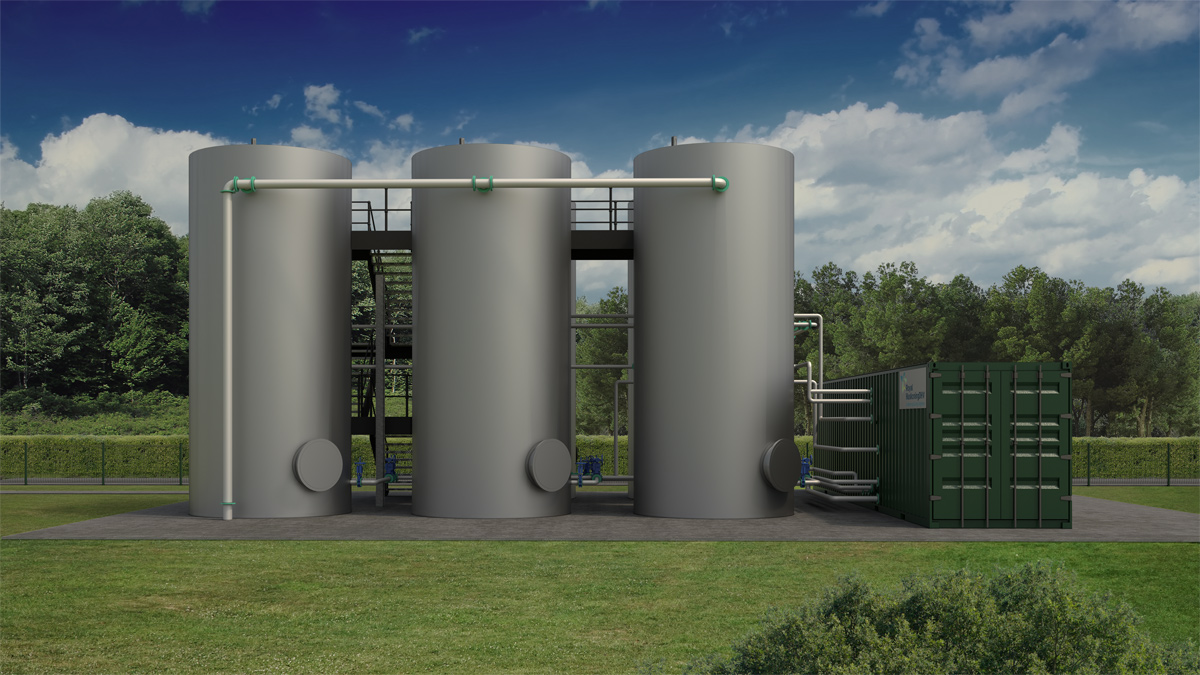
Render of Nereda Package Plant – Courtesy of Royal HaskoningDHV
The solution
Nereda technology is well established worldwide with 81 plants operational or under construction. In the UK and Ireland alone, there are 15 operational full scale Nereda plants, three under construction and several new projects being developed.
Full-scale Nereda plants are designed and developed specifically for each project, based on the particular requirements of the site. These plants include extensive instrumentation to enable the operators to closely monitor the underlying biological performance of the plant once it is operational. Due to the extent of instrumentation required, traditional Nereda plants previously have only proved to represent a competitive solution for plants serving in excess of 10,000 customers.
In recent years Royal HaskoningDHV has been approached by water companies and consultants to provide Nereda solutions at small scale, but until now, it has not been possible. However, taking into account the interest in small scale Nereda plants and the demand in AMP 7, the company has researched and developed a series of standardised Nereda Package and Mini Plants for small works. Nereda Package Plants have been developed to provide a factory built, competitive, sustainable, lowest whole life cost solution. In addition to meeting the P removal requirements, the package plants have also been designed to meet high standards of nitrogen removal and Nereda technology is well proven for achieving treated water ammonia consents down to 1 mg/l and Total N consents well below 10 mg/l.
Nereda Mini Plants also benefit from some elements of offsite manufacture, including the factory build of the mechanical, electrical and instrumentation plant before site assembly within prefabricated civils structures. These have been designed to treat wastewater at small plants serving between 1600 – 10,000 customers.
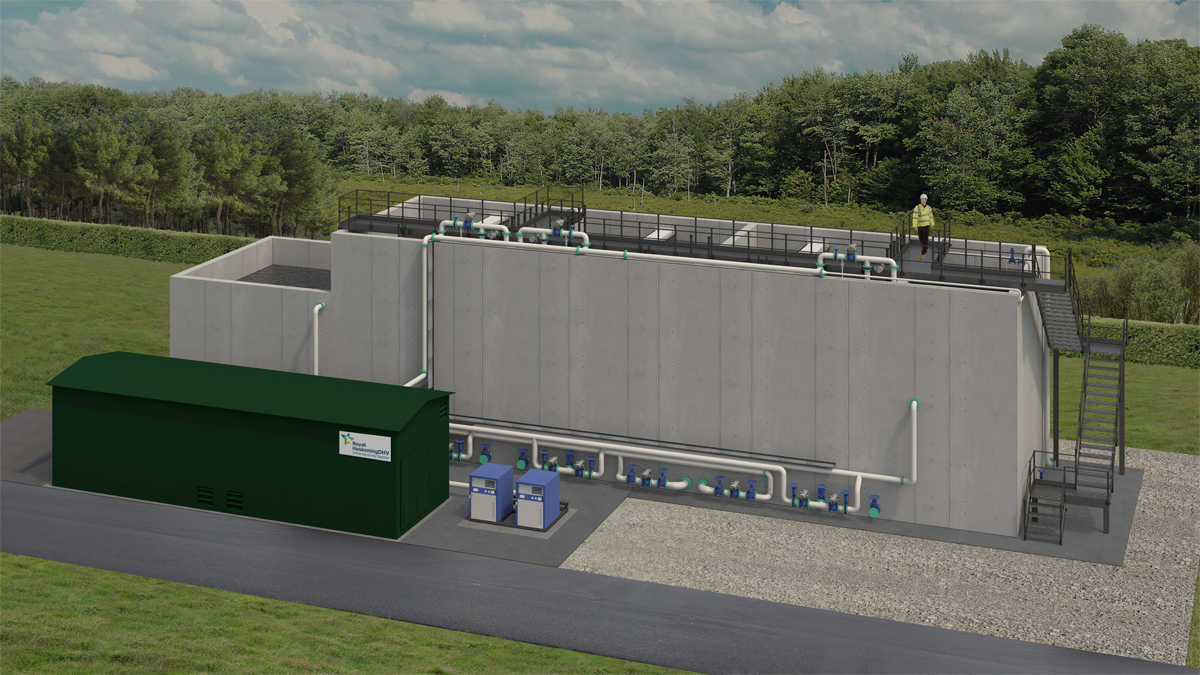
Render of Nereda Mini Plant – Courtesy of Royal HaskoningDHV
Description
A new approach was needed to enable Royal HaskoningDHV to be able to provide Nereda technology, for sustainable wastewater treatment, including P removal, at small works. Nereda Package Plants have been designed based on the following principles:
Design one, build many: Designing one plant and building many gives the advantages of minimum design costs, safe and efficient manufacture, construction, pre-testing, site assembly and process start-up. Further economies of scale can be introduced where a water company commits to a programme of Nereda Package Plants, where each small WwTP has the same treatment plant, allowing for efficiencies in operation and maintenance.
Build on the learning of R&D programme outcomes: Extensive pilot-scale and full-scale monitoring, together with ongoing R&D programmes has identified the need for small works investment. This has led to simple instrumentation and control, removing complex analytical instruments, and using dissolved oxygen, turbidity, redox, and pH control.
Standardised design, and factory build: Factory assembly and pre-testing, followed by transportation to site with safe, fast, and efficient assembly. The benefits of this approach include higher standards of health and safety, improved quality of build and resource efficiencies with construction being carried out offsite, the speed of installation on site and with less resource required onsite, there is less disruption to existing operations. The Nereda Package Plant also benefits from a small, consistent footprint, with the whole plant simply erected on a simple concrete plinth.
Enhanced control: Continuous monitoring and learning, optimising and predictive control and automation provides 24-7 virtual operator support that never sleeps. This is provided by Royal HaskoningDHV’s unique Aquasuite® software and operational support services.
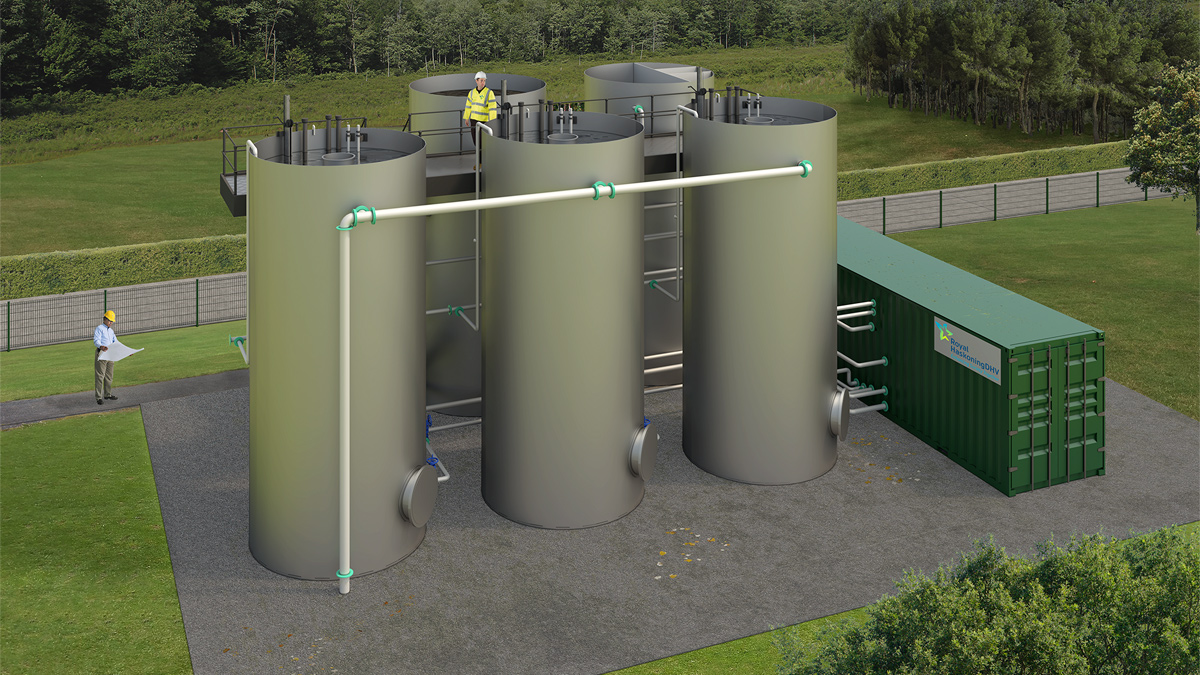
3D model of Nereda Package Plant – Courtesy of Royal HaskoningDHV
Efficient delivery of programmes of Nereda Package Plants: With water companies strongly encouraged to commit to programmes of work, not only do they benefit from economies of scale, but can also benefit from efficient delivery with certainty of budget, quality and timely completion.
Turnkey MEICA delivery in partnership with experienced supply partners: In order to enable Royal HaskoningDHV to meet the potential need of the UK water sector, the company has developed supplier agreements with three experienced specialist contractors, Suprafilt, Eliquo Hydrok and EPS Water. These partners will provide the turnkey factory build, transportation to site, assembly and process start up. Each supply partner has proven capability in delivering larger Nereda installations and together will provide the capacity to meet demand across the UK.
Design
The Nereda Package Plant is a scaled-down and simplified version of the full-scale Nereda wastewater technology. Screened wastewater is transferred into the influent buffer, the wastewater is then transferred into each of the Nereda reactors in turn. The waste sludge is collected and thickened in a separate tank and is then transported off site, typically on a weekly basis. In addition to the process tanks, there is a containerised plant building, which houses the MCC control room, as well as a separate room for major plant and equipment including pumps, blowers, control valves, pipework and standby trim chemical dosing. The plant also includes stairway access and walkway to allow safe access for operation, monitoring of plant performance and maintenance.
Nereda Package Plants have been designed so that little or no chemical dosing is required to achieve the TP consent. However, where the P consents are particularly stringent, additional dosing might be required and, in some cases, the process may include tertiary solids removal.
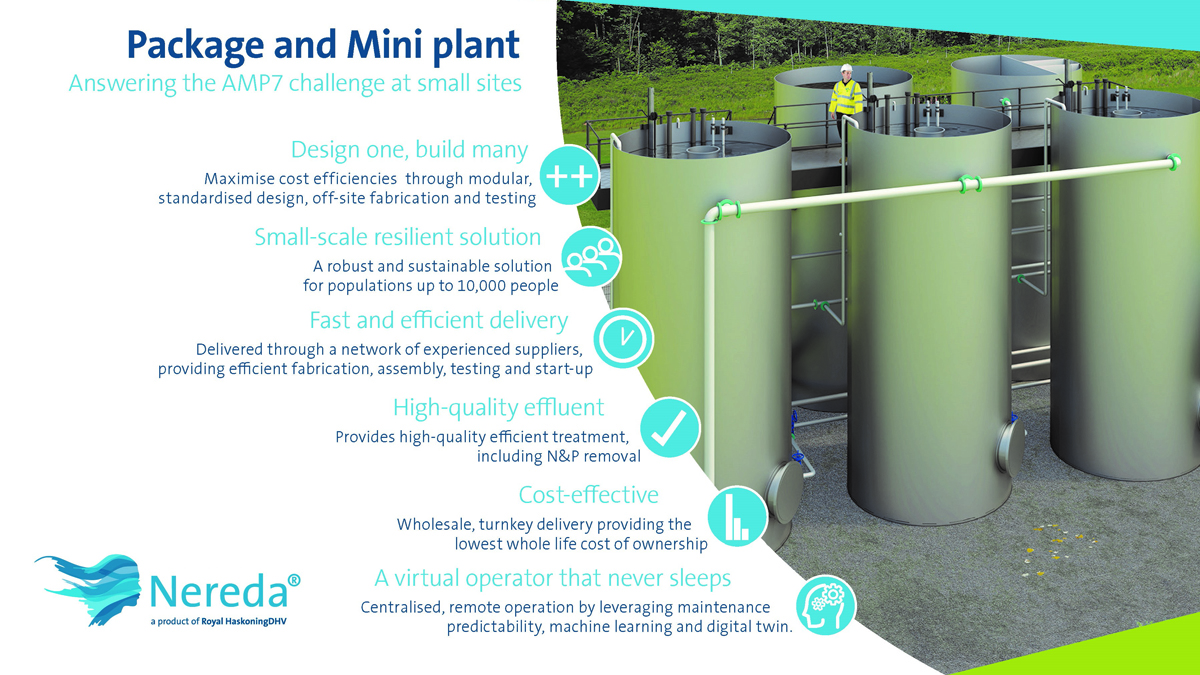
Timescales
One of the benefits of the Nereda Package Plant is the potential for rapid implementation. It is possible for a Nereda Package Plant to progress from award to full operation within just 24 weeks. With the onsite assembly, testing and process start-up taking just four weeks.
Sustainable solution
The Nereda Package Plant has been designed to be resilient, able to maintain consent even if one of the reactors is taken out of service for maintenance and extendable to meet growth or tighter future consent standards. MyNereda provides operators with operational support, including fully automatic monitoring of performance and optimisation support. The Nereda Package Plant also benefits from having a Nereda Aquasuite controller, which uses learning and optimising software to ensure that the plant automatically adjusts to the wide range of operating conditions. It ensures a leading digital solution for efficient, automatic operation and control with the support of a virtual operator that never sleeps.
The Mini Nereda
Working closely with several water companies demonstrated the need for Nereda technology for larger WwTPs, serving populations of 1,500 to 10,000. At this scale factory build and transport to site of the process tanks is not normally possible. However, Royal HaskoningDHV has taken its learning from the development of its Nereda Package Plant and reviewed the use of prefabricated standardised concrete structures.
Several prefabricated concrete specialists have responded and offered very competitive standard structures. In addition, Royal HaskoningDHV’s supply partners have committed to providing the full MEICA plant on a turnkey basis. This means that Nereda technology can be confidently and cost-effectively implemented as a standard, resilient and sustainable solution for all wastewater treatment works serving populations of up to 10,000 people using the standardised Nereda Package and Mini Plants.
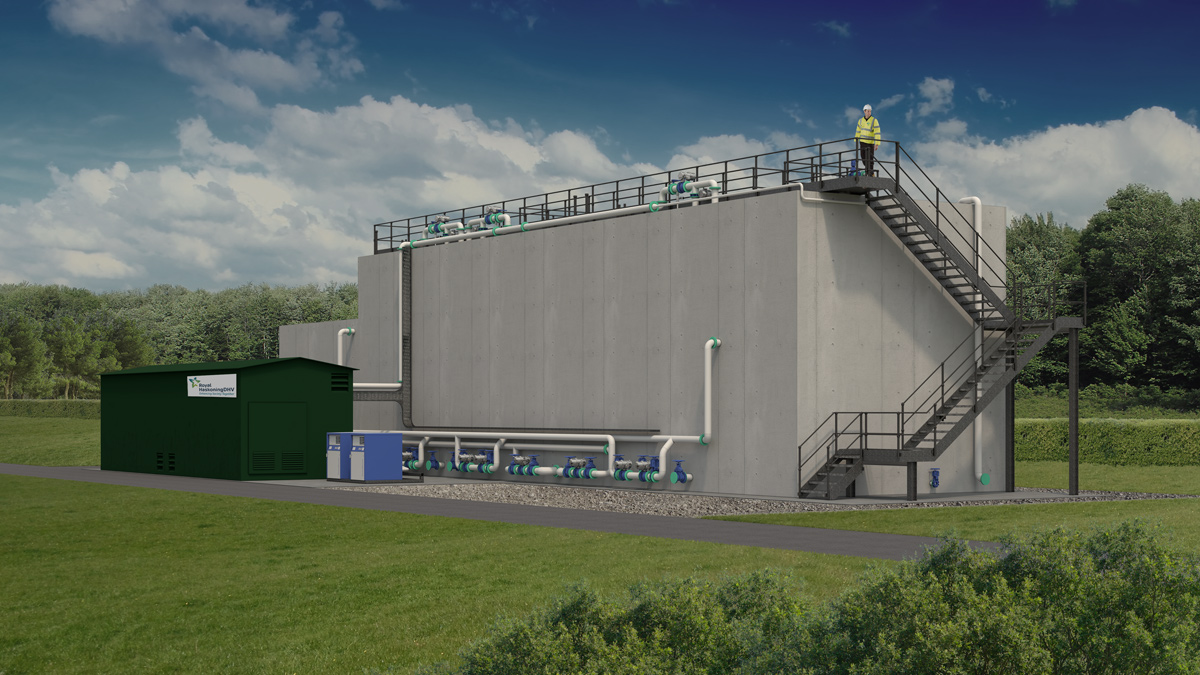
3D model of Nereda Mini – Courtesy of Royal HaskoningDHV
Product range
The Nereda Package Plant has been designed in three sizes to meet the requirements of WwTPs up to 1600 pe. While the Nereda Mini Plants comes in four standard sizes and cover the population range from 1600 up to 10,000.
First past the post
Initial interest in Nereda Package and Mini plants is very high, with the team in conversation with many of the water companies across the UK. Following the successful delivery of full-scale Nereda plants at Kendal (2019), Morecambe (2020) and Failsworth (2019), United Utilities was the first water company to adopt the new Nereda Package Plant technology. The first plant is currently being built at its Westnewton STW.
This paper was prepared by Barry Oliver, Nereda Regional Sales Director – Europe Middle East & Africa at Royal HaskoningDHV.
For more information: Royal HaskoningDHV | +44 (0)121 709 6521 |www.nereda.net


